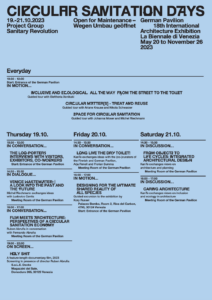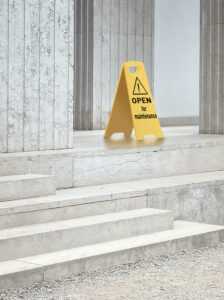use: headquarters and rehearsal spaces
collaborators: LDSRa
location: Brugge
country: Belgium







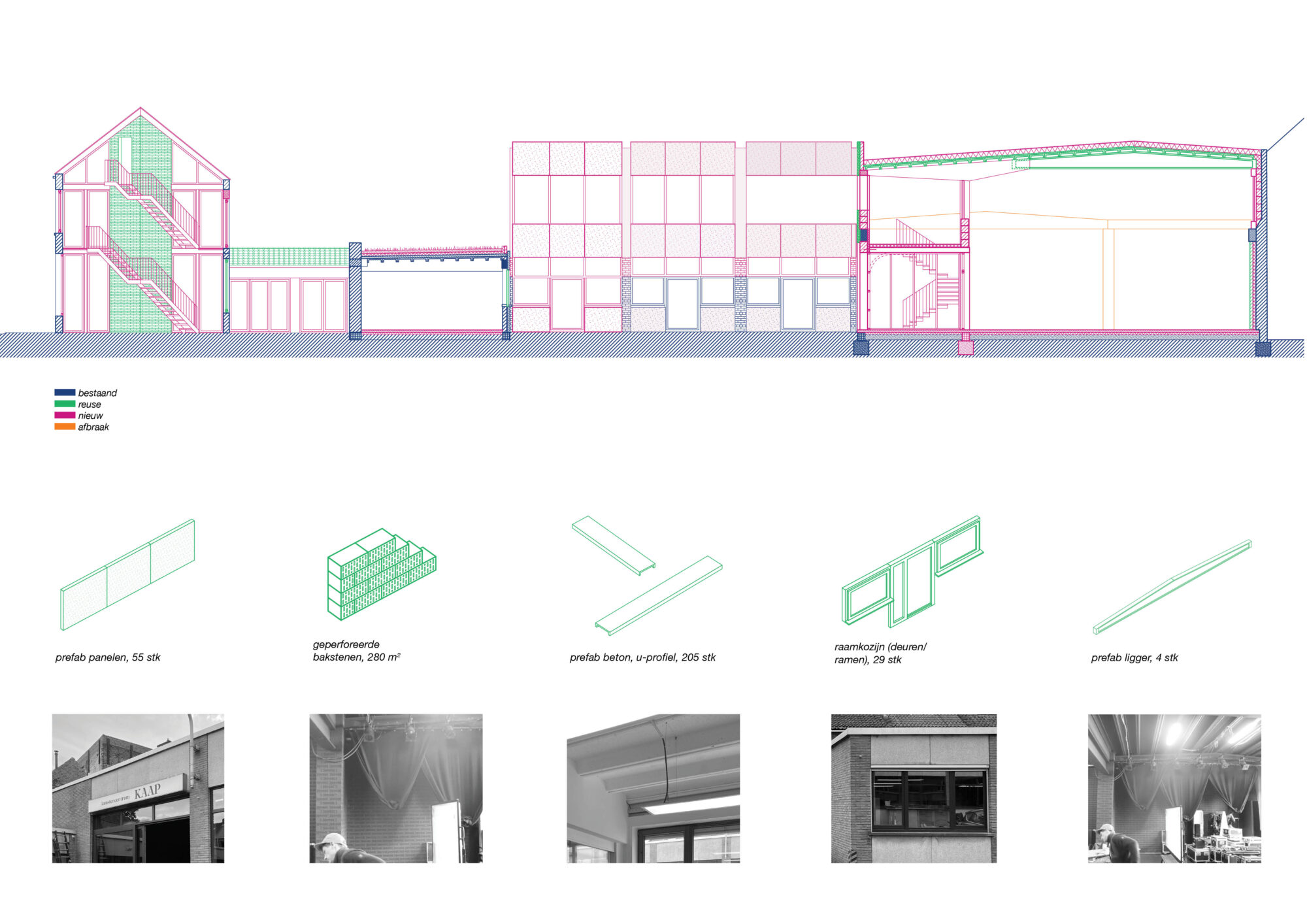


use: student housing
collaborators: AgwA
location: Brussels
country: Belgium




















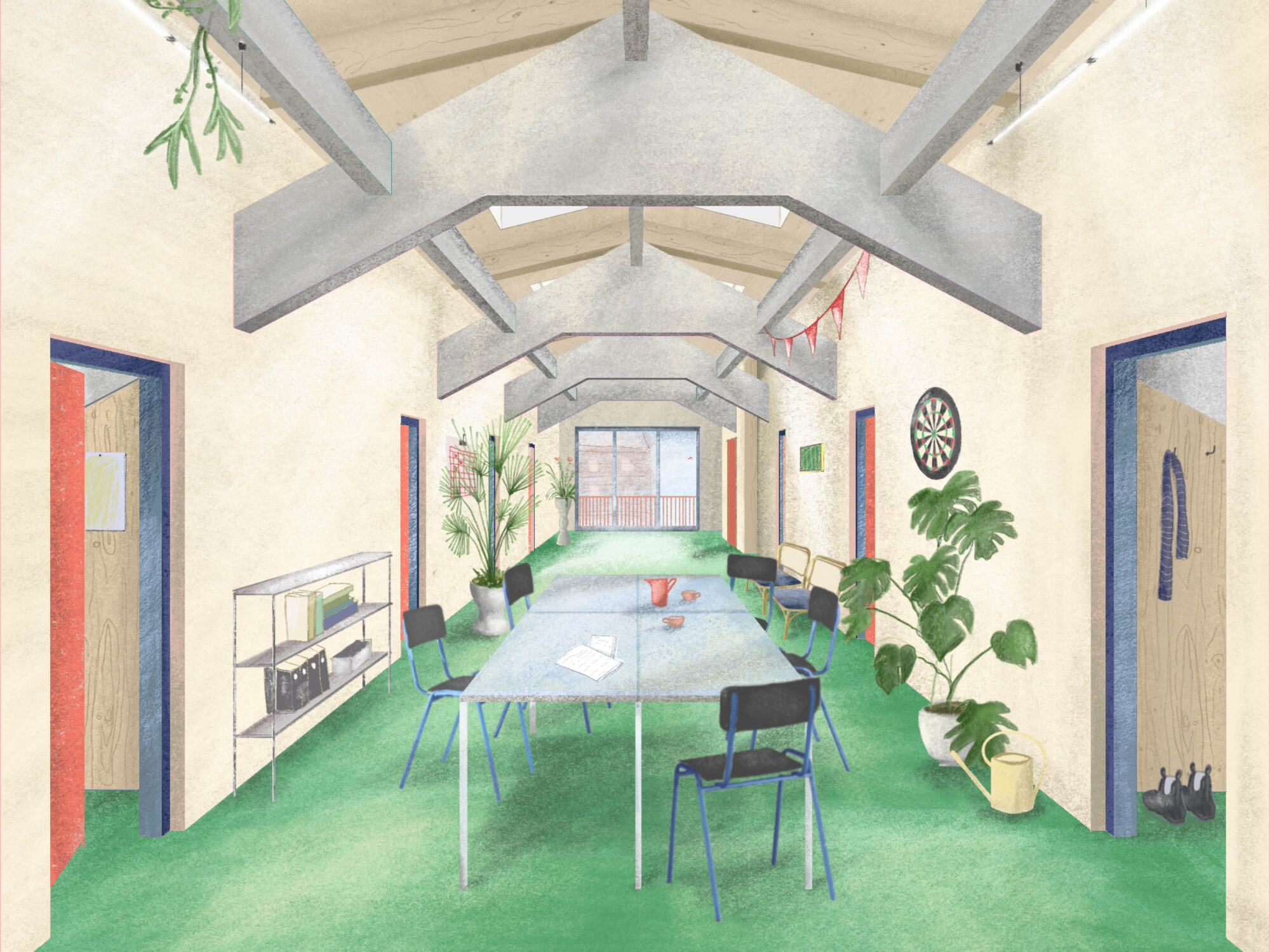



















use: social housing
collaborators: Lamusch architecten
location: Ghent
country: Belgium
The renovation of the 62 social housing units for elderly people in the Tuinwijk de Warande is aiming to enhance both the functionality and livability of the neighborhood. While maintaining livable conditions throughout the phased renovation, the homes are being upgraded in ways that improve their connection to the street and garden, while also rethinking interior layouts to better suit contemporary needs. Within the compact footprint, the reconfigured floorplans introduce a flexible spatial framework, allowing different patterns of use and enabling residents to appropriate the interior organization over time. The protected street facade will be respectfully renovated and enriched by adding communal bike storages in between the different blocks.
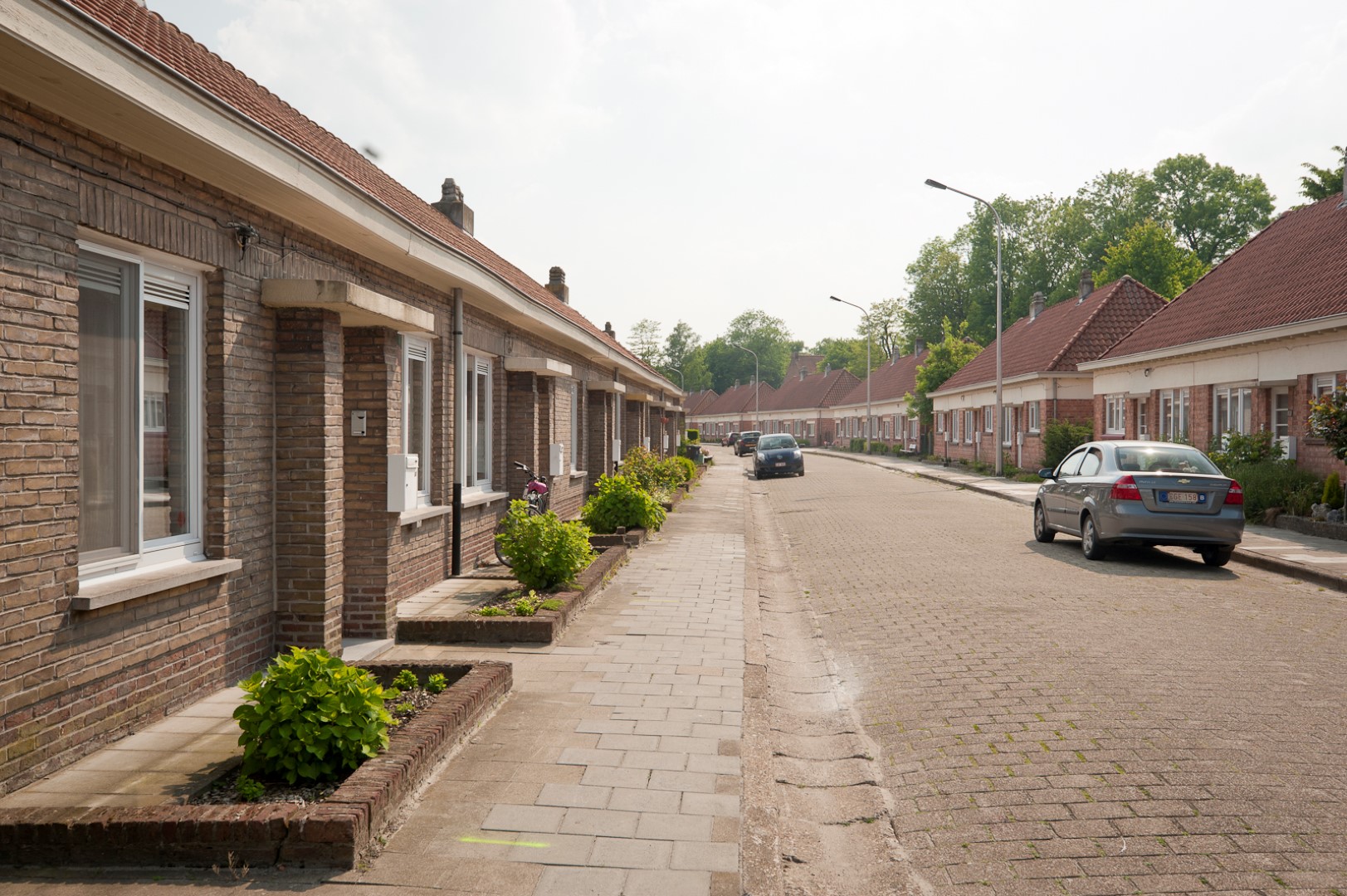
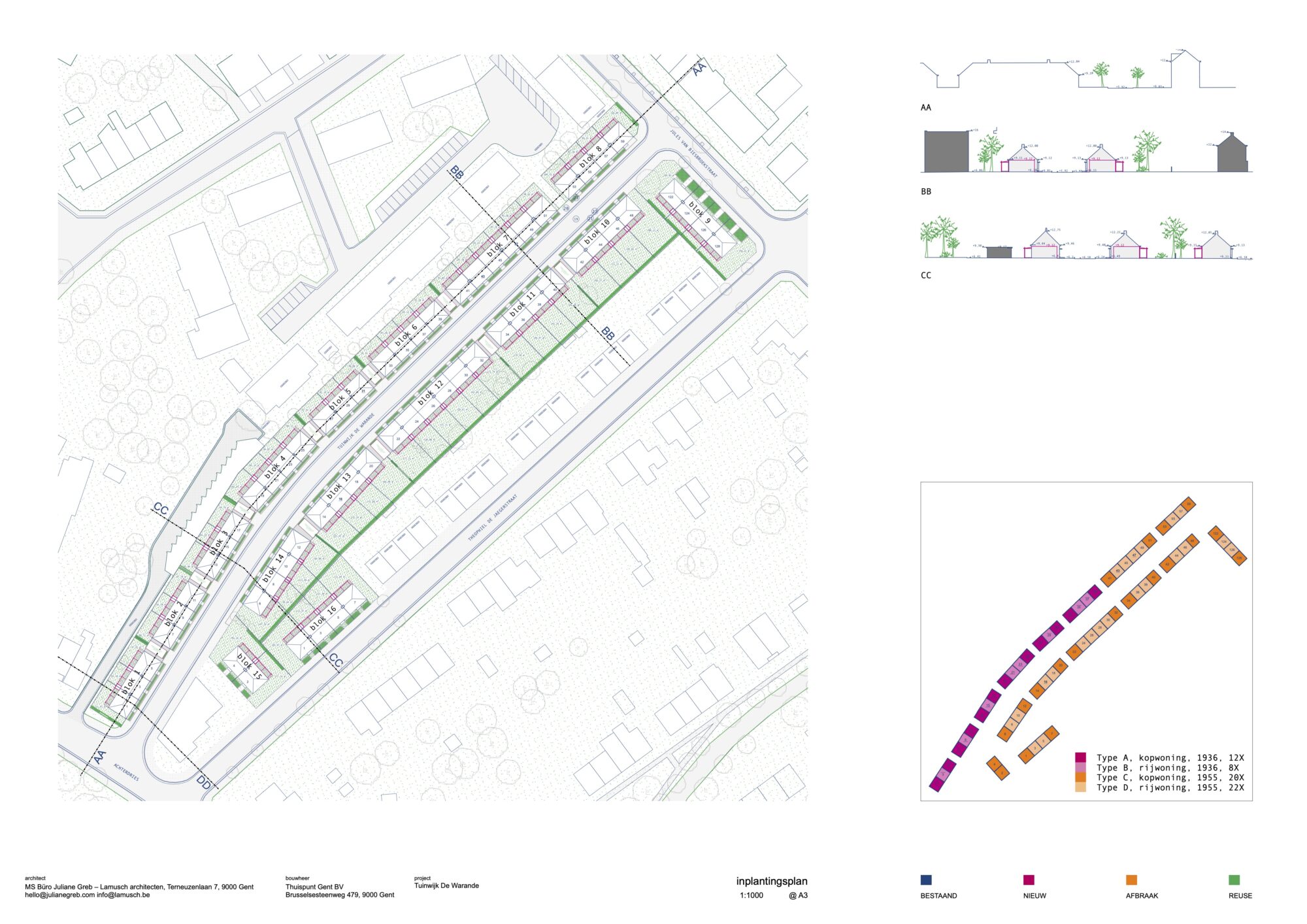
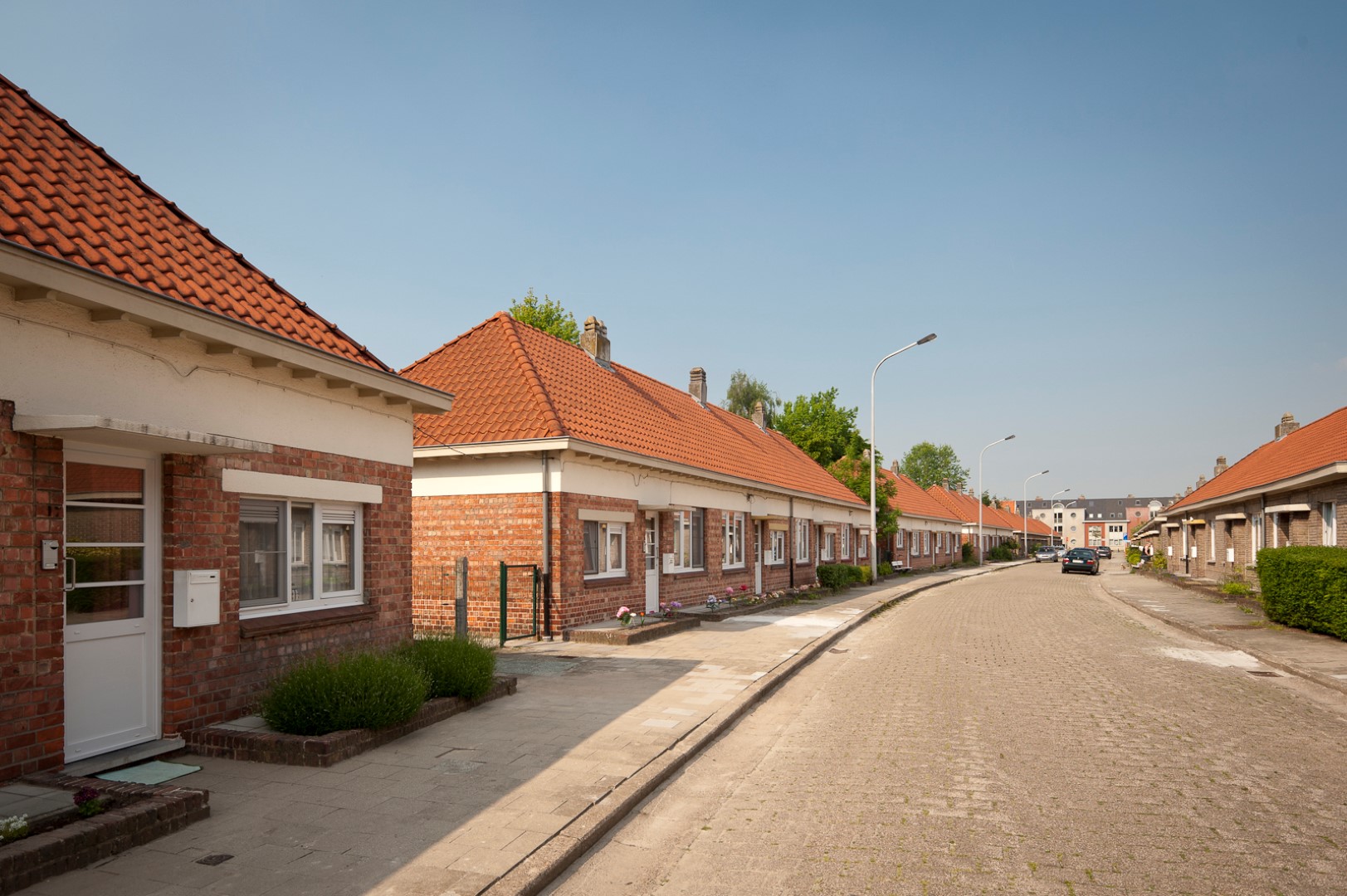


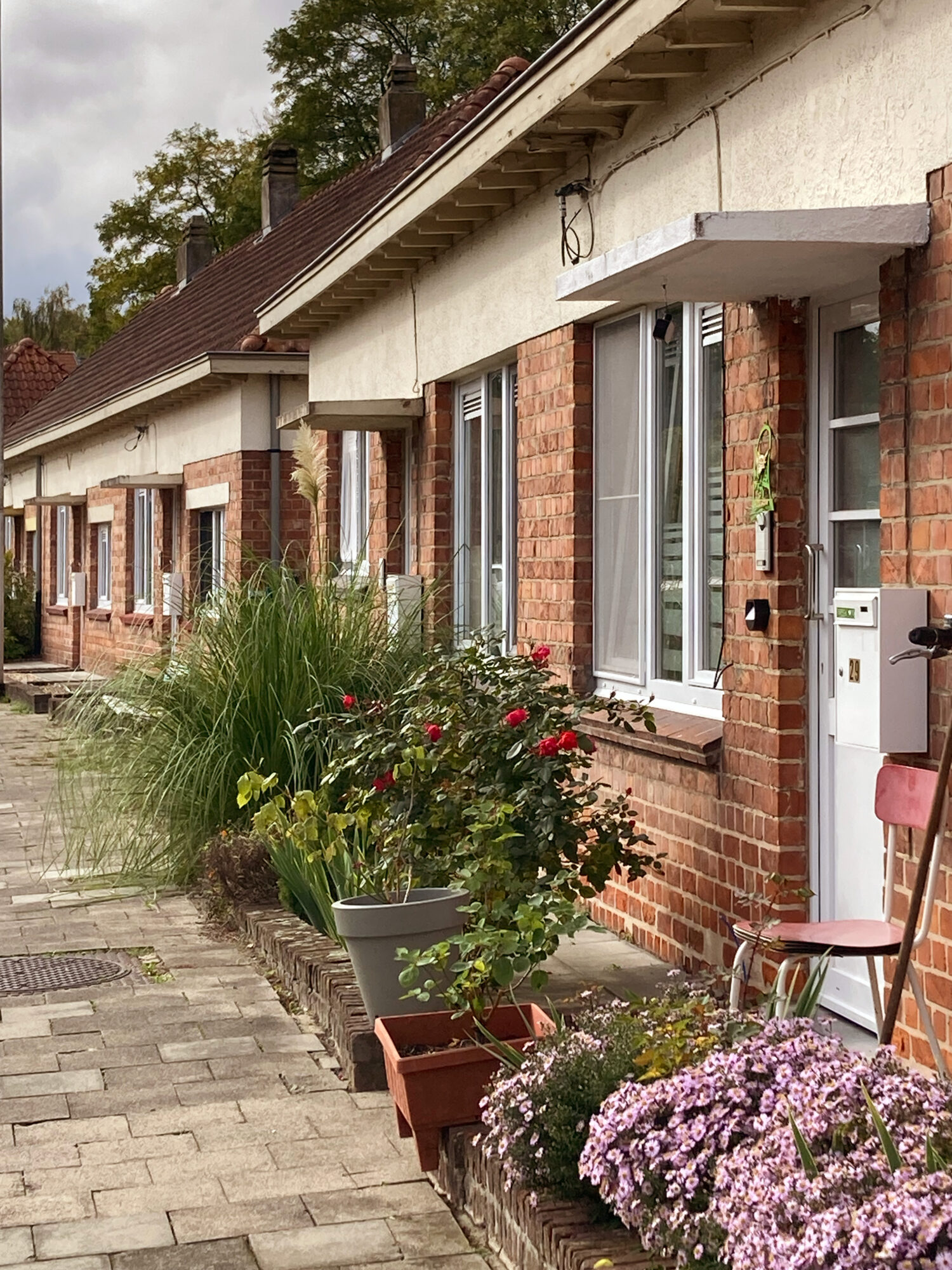
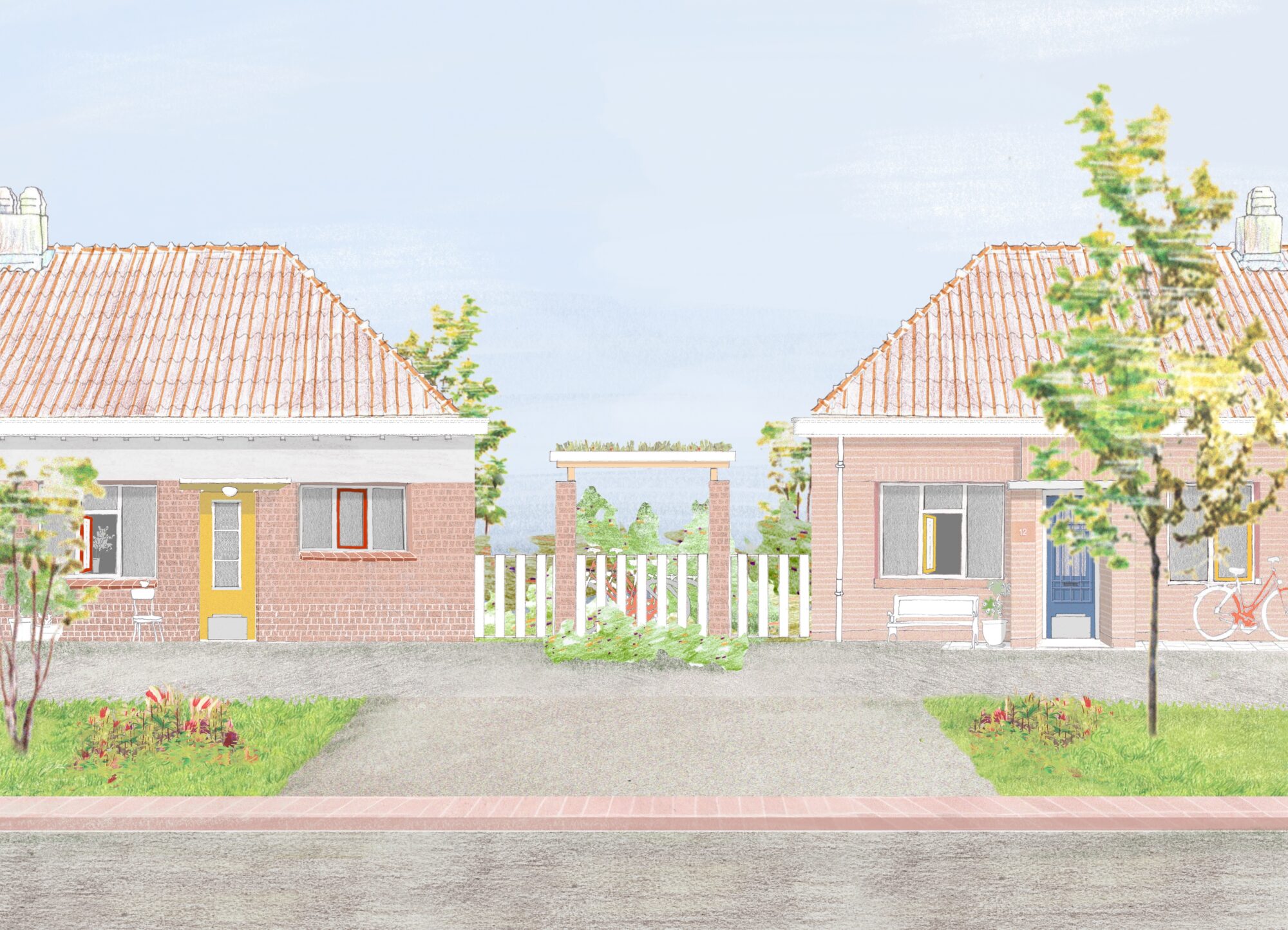

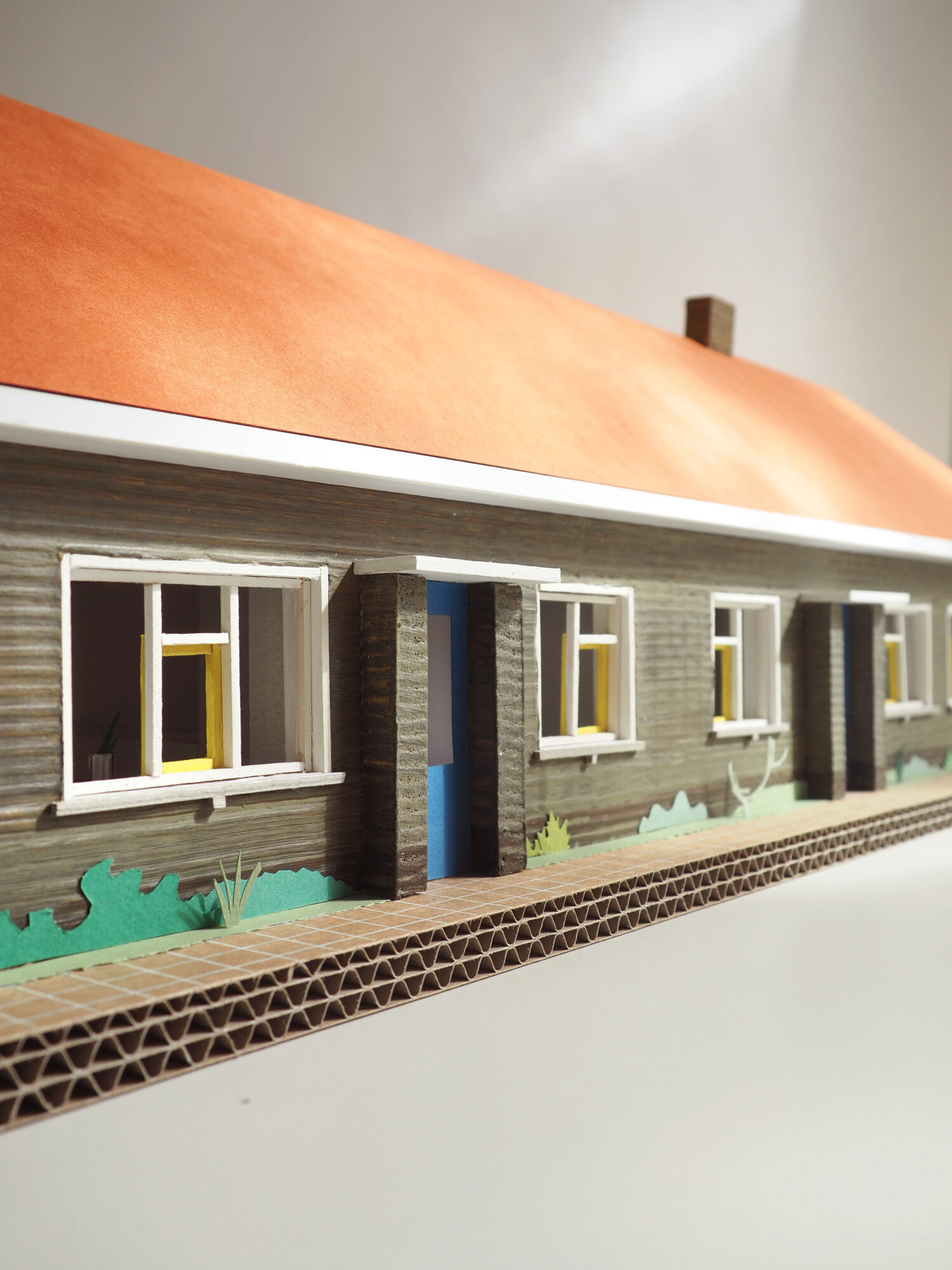
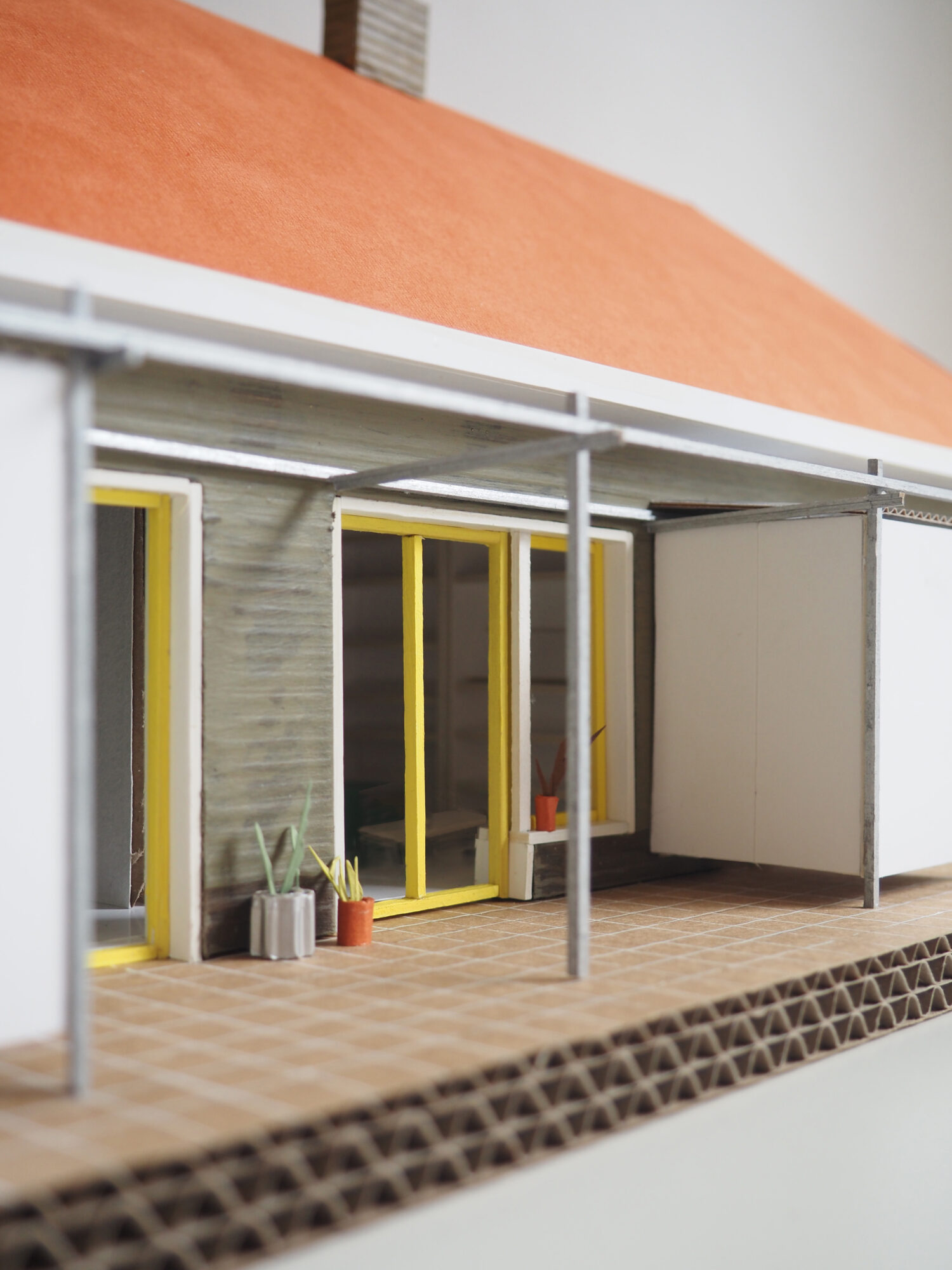
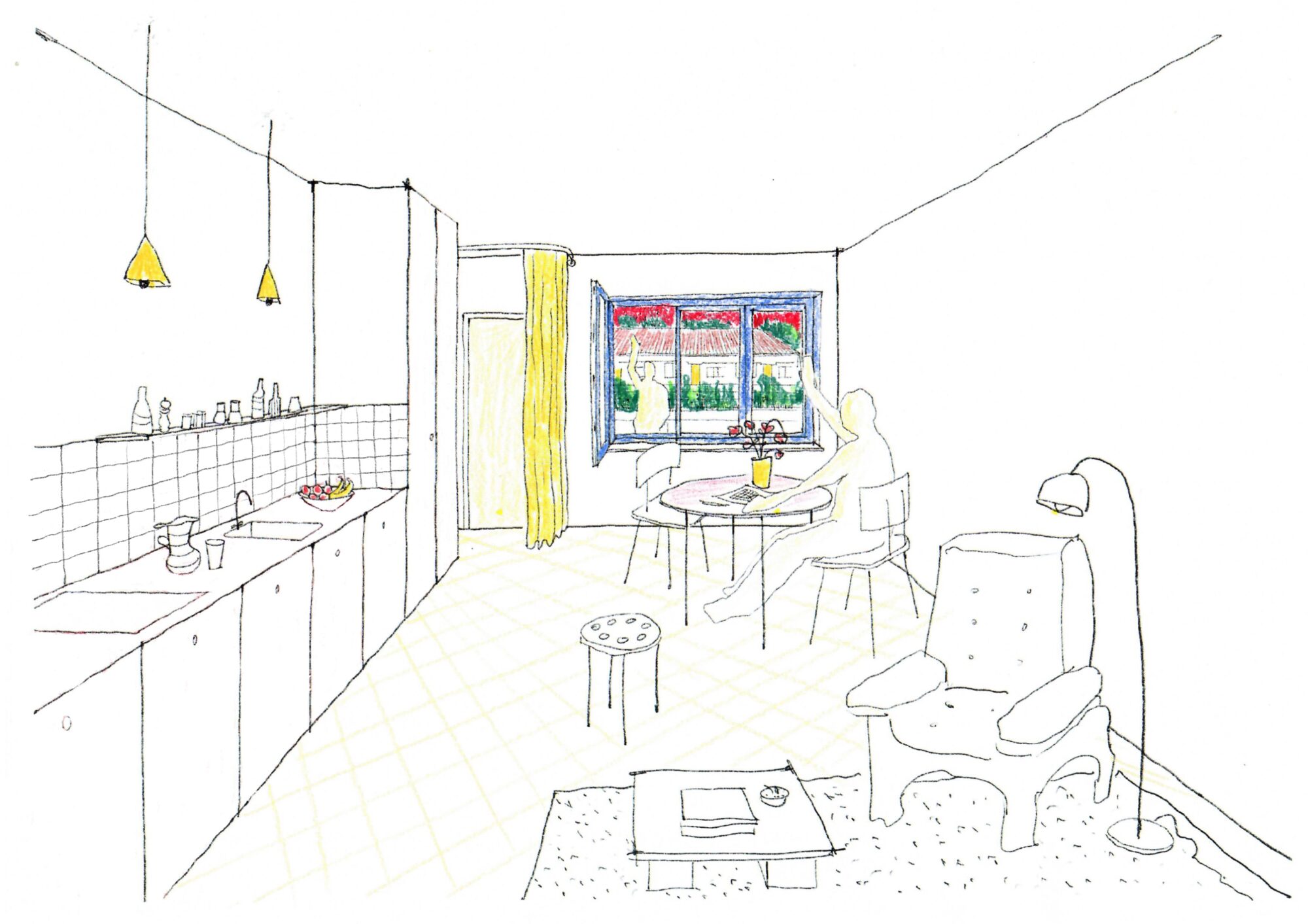
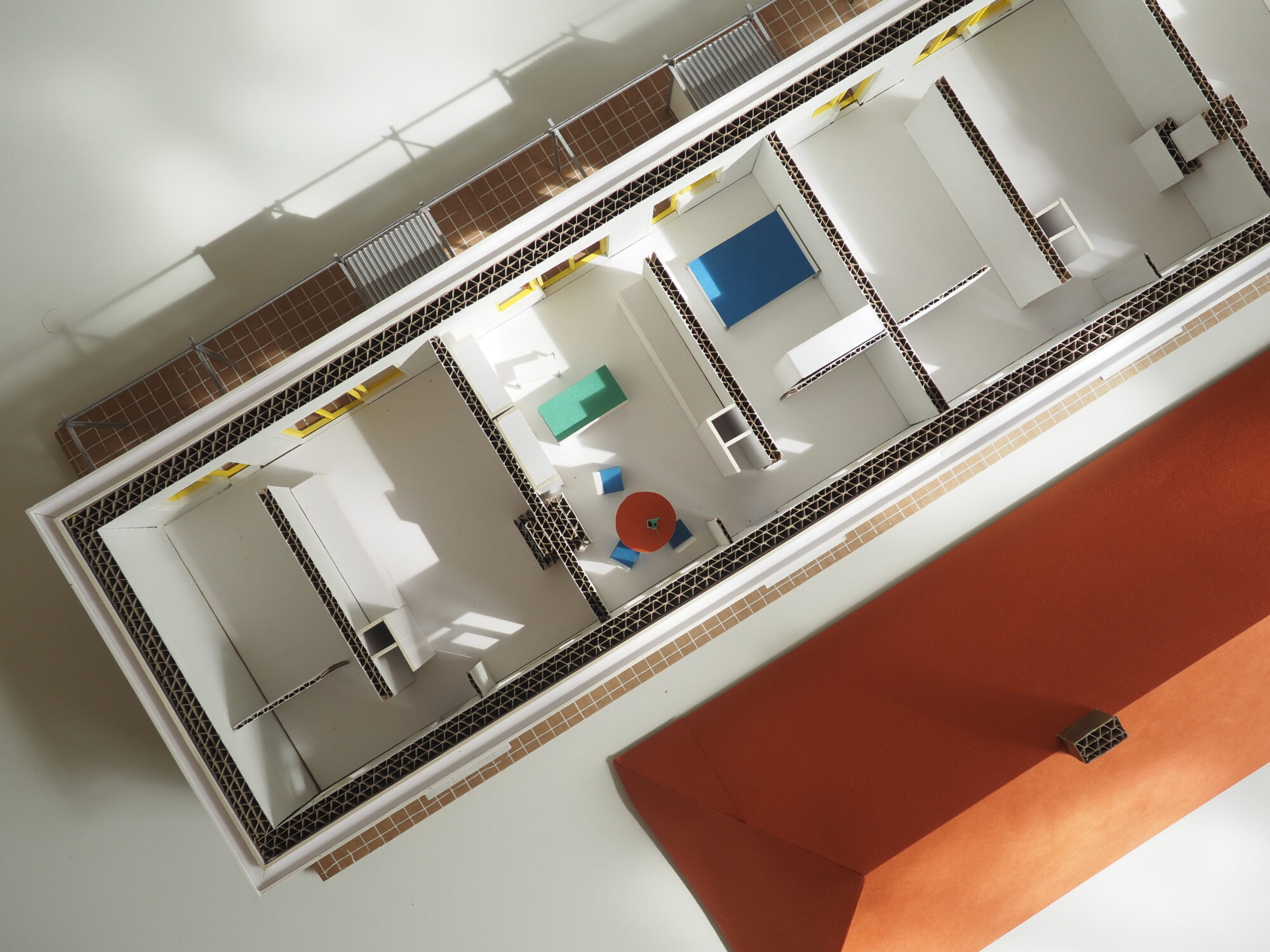

ARCH+ / SUMMACUMFEMMER / BÜRO JULIANE GREB
curatorial team: Anne Femmer, Franziska Gödicke, Juliane Greb, Christian Hiller, Petter Krag, Melissa Makele, Anh-Linh Ngo, Florian Summa
location: Giardini della Biennale, Venice, Italy
www.openformaintenance.net
www.openformaintenance-depot.net
Catalogue: https://archplus.net/de/archiv/ausgabe/252/
Instagram: @germanpavilionvenice
Open for Maintenance is not an exhibition. It is an action framework for a building culture beyond the prevailing model hinging on the exploitation of resources and humans. The spotlight is put on previously used materials gathered from over 40 national pavilions and exhibitions at the 2022 Art Biennale, as well as on a broad network of Venetian and German activist groups. By carefully working with the existing—in material, social, and urban terms—the German Pavilion renders visible processes of spatial and social care work which are usually kept hidden.
Open for Maintenance squats and maintains the German Pavilion “as found,” including Maria Eichhorn’s contribution Relocating a Structure for the 2022 Art Biennale. In this way, the Art and Architecture Biennales become spatially and programmatically interwoven for the first time. The new architectural interventions are oriented towards local needs and include a ramp for accessibility, an ecological and nondiscriminatory bathroom, a space for meetings, a kitchenette, a material repository, and a workshop. The interventions, made entirely with materials salvaged from the 2022 Art Biennale, address questions of social and spatial inclusion in addition to resource issues. Open for Maintenance transforms the monumental German Pavilion into a living place of (re)production. Assisting various groups from civil society, university students and crafts apprentices will help to maintain, repair, and care for social infrastructures across Venice as part of the Maintenance 1:1 workshop program. Designing with the unpredictable—be it the unknown availability of materials or the open-ended participatory processes—generates creative possibilities that spell an optimistic outlook for architecture while simultaneously contributing to its regeneration as a social practice.

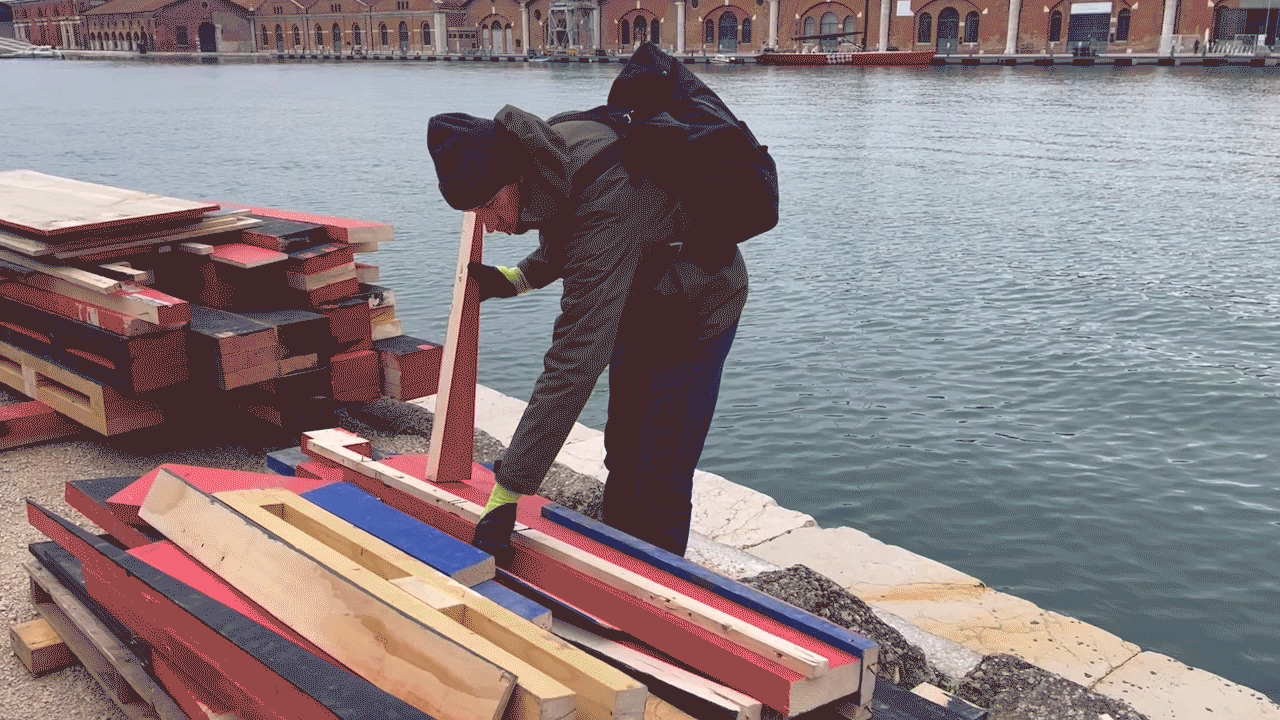


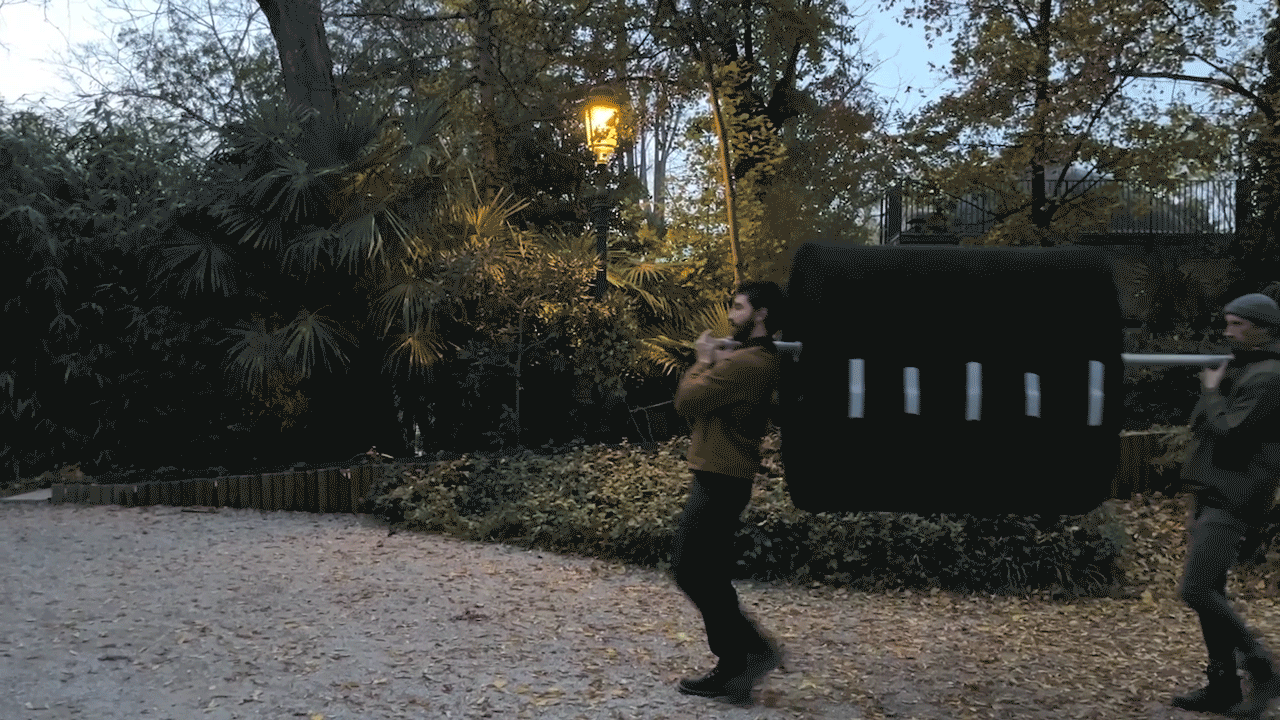






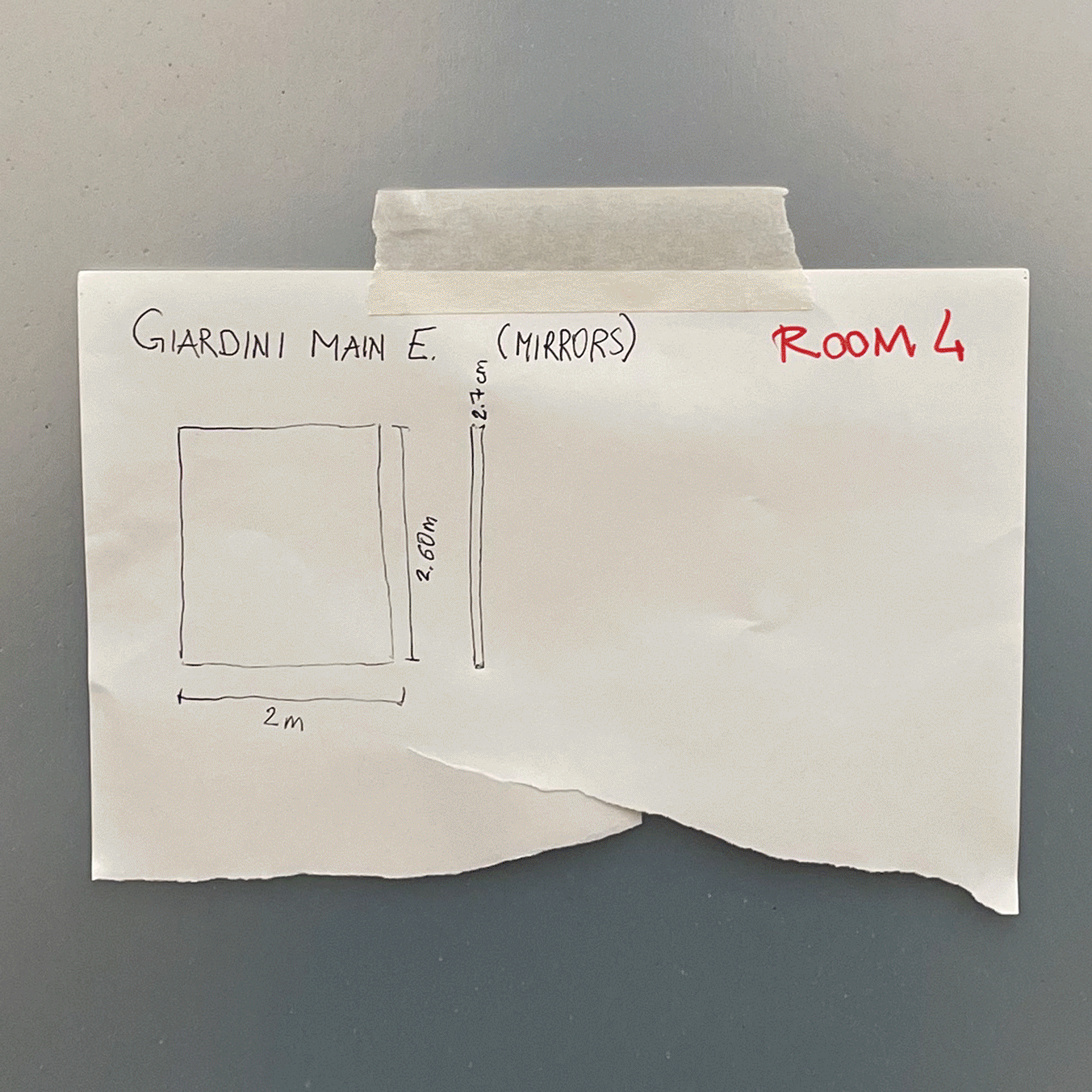






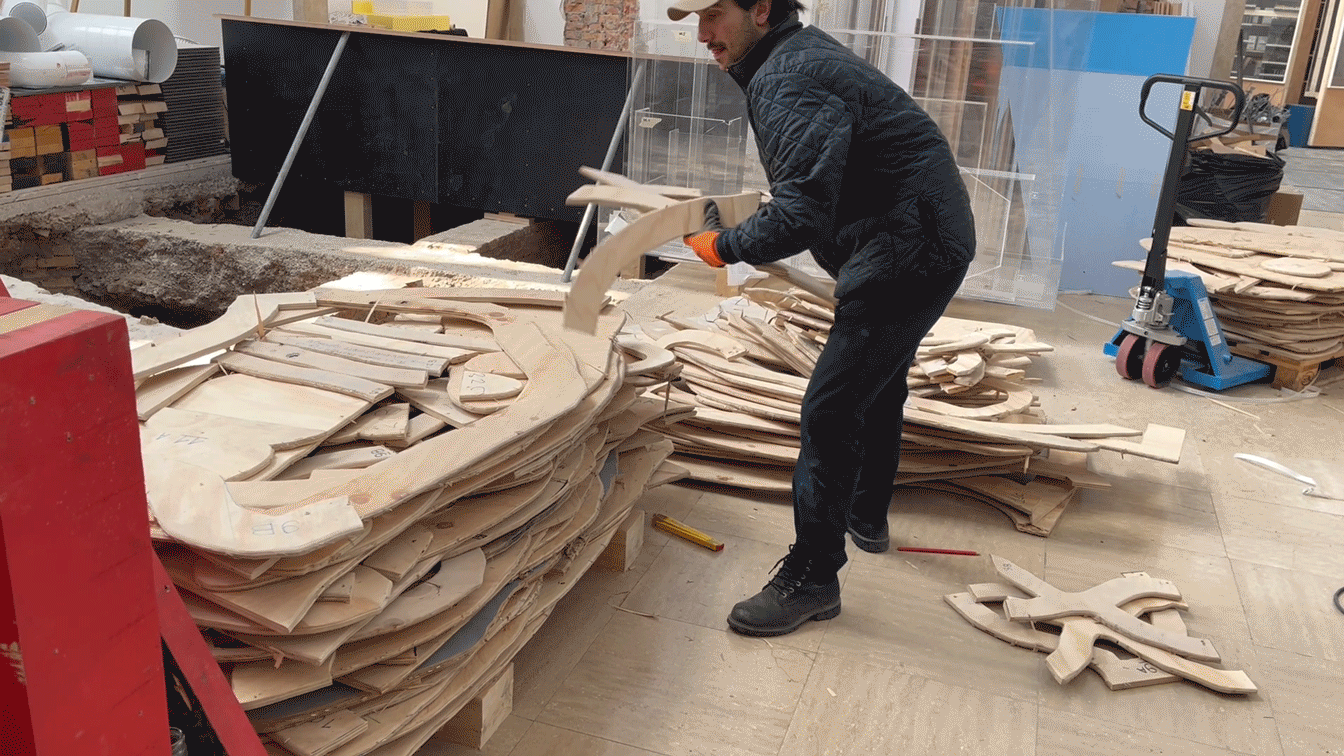








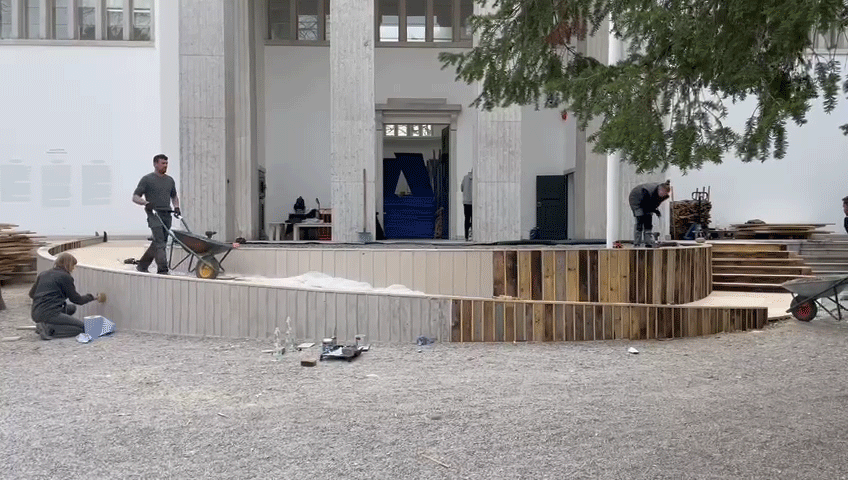
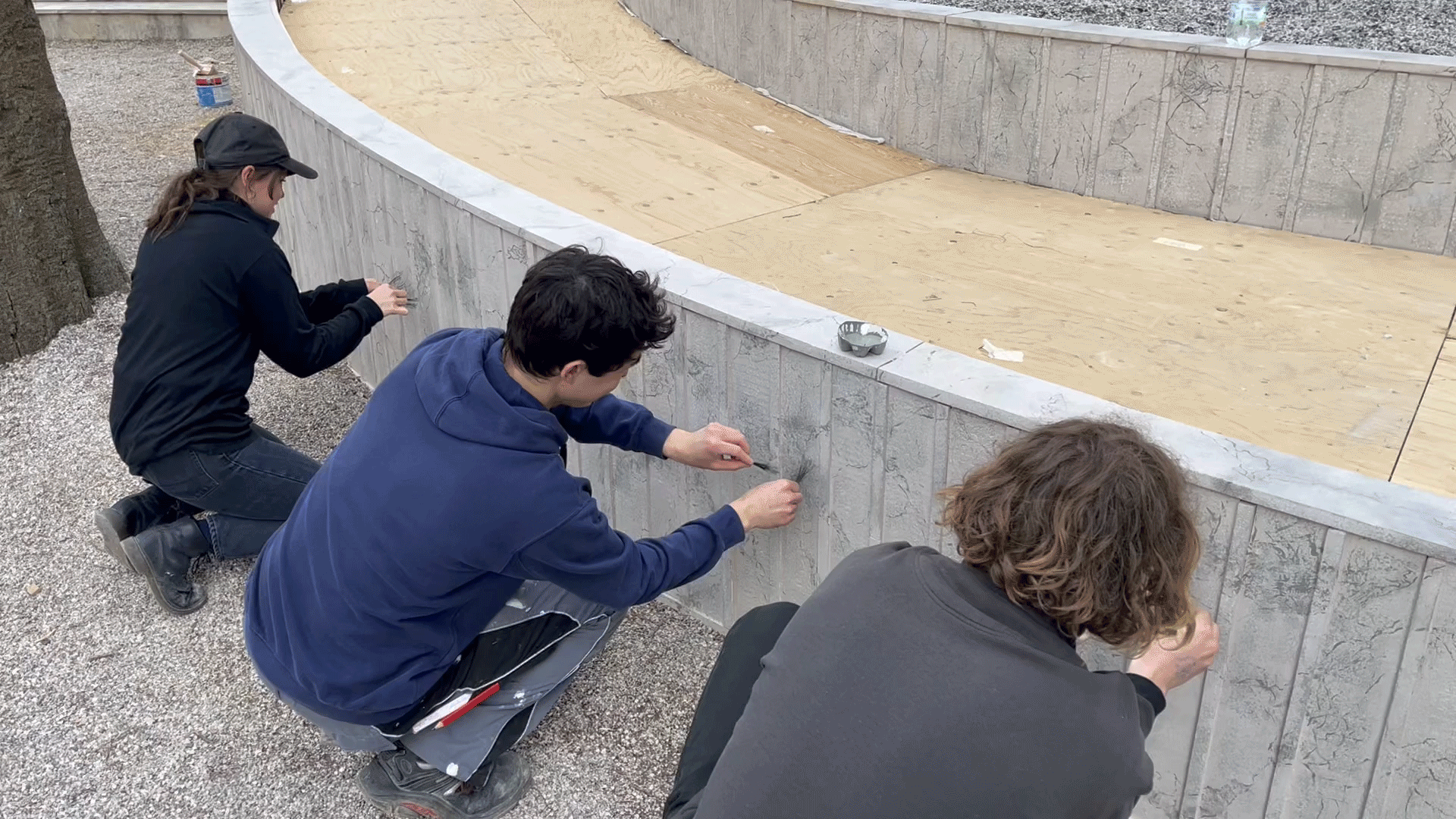

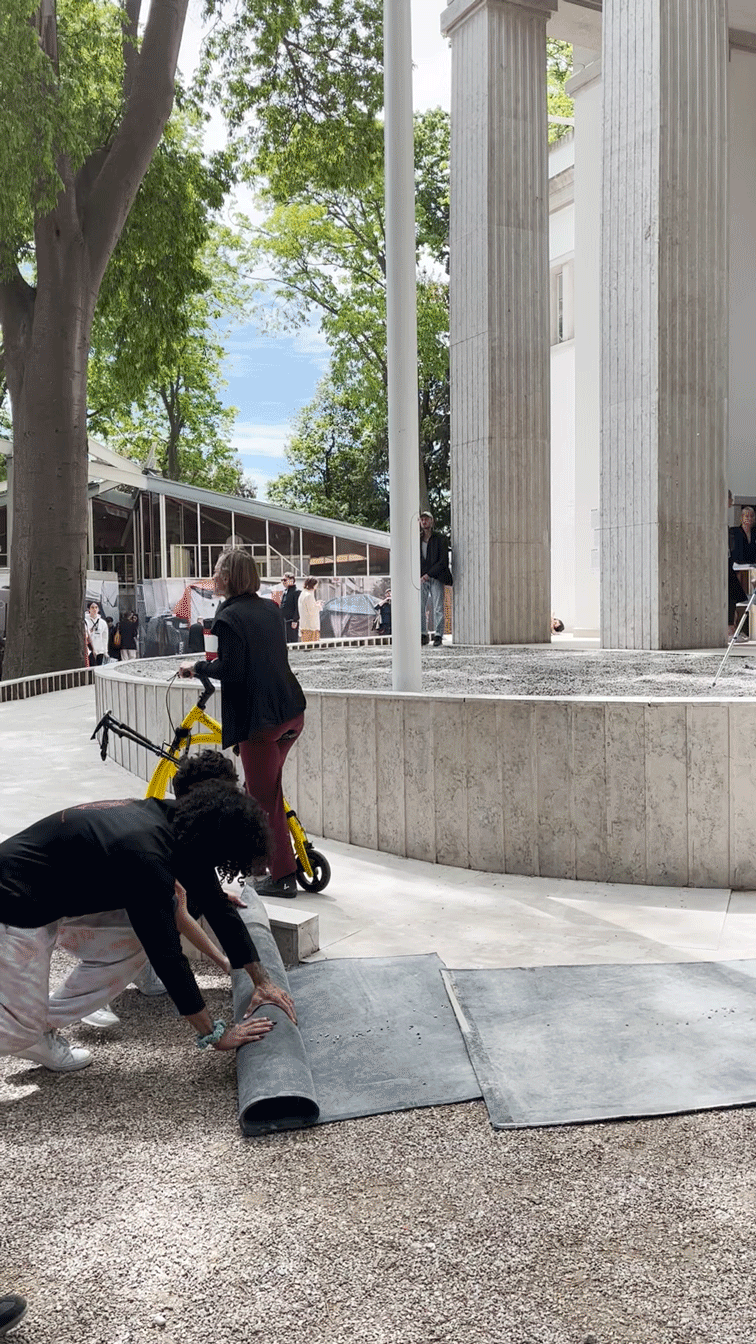





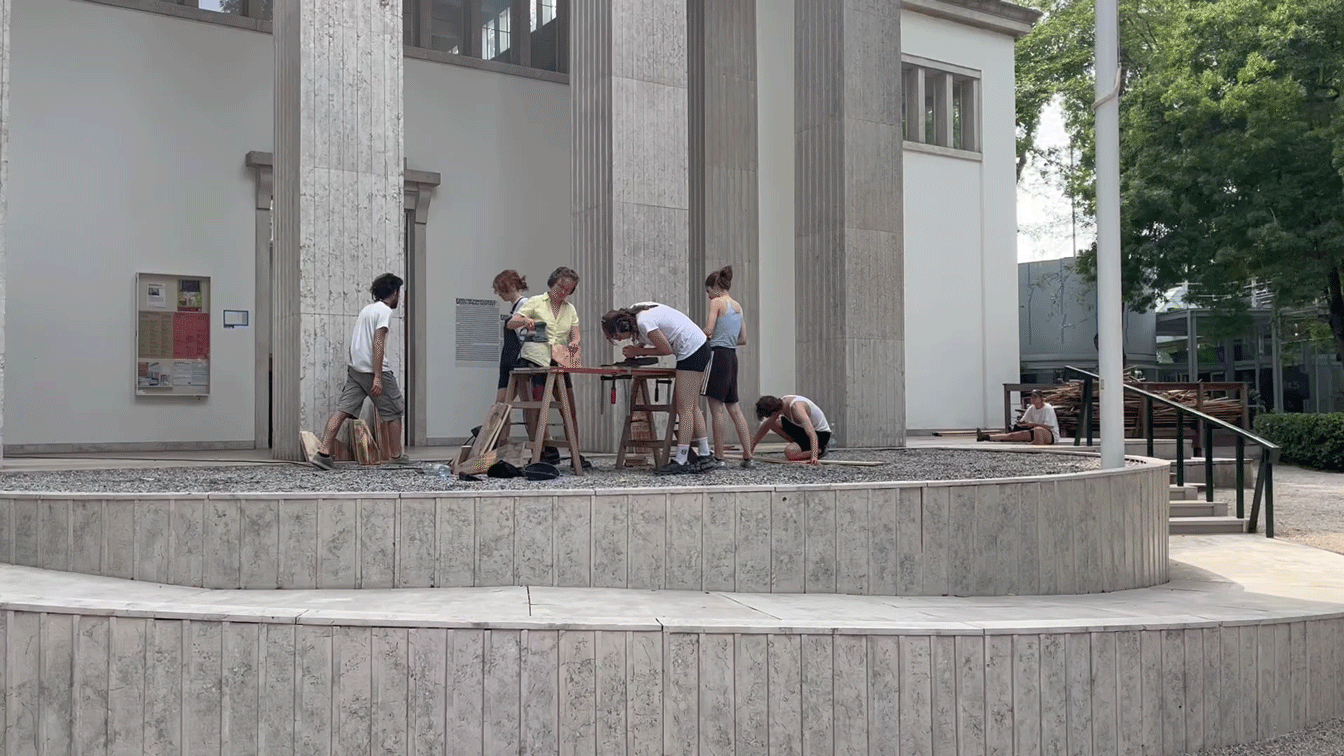
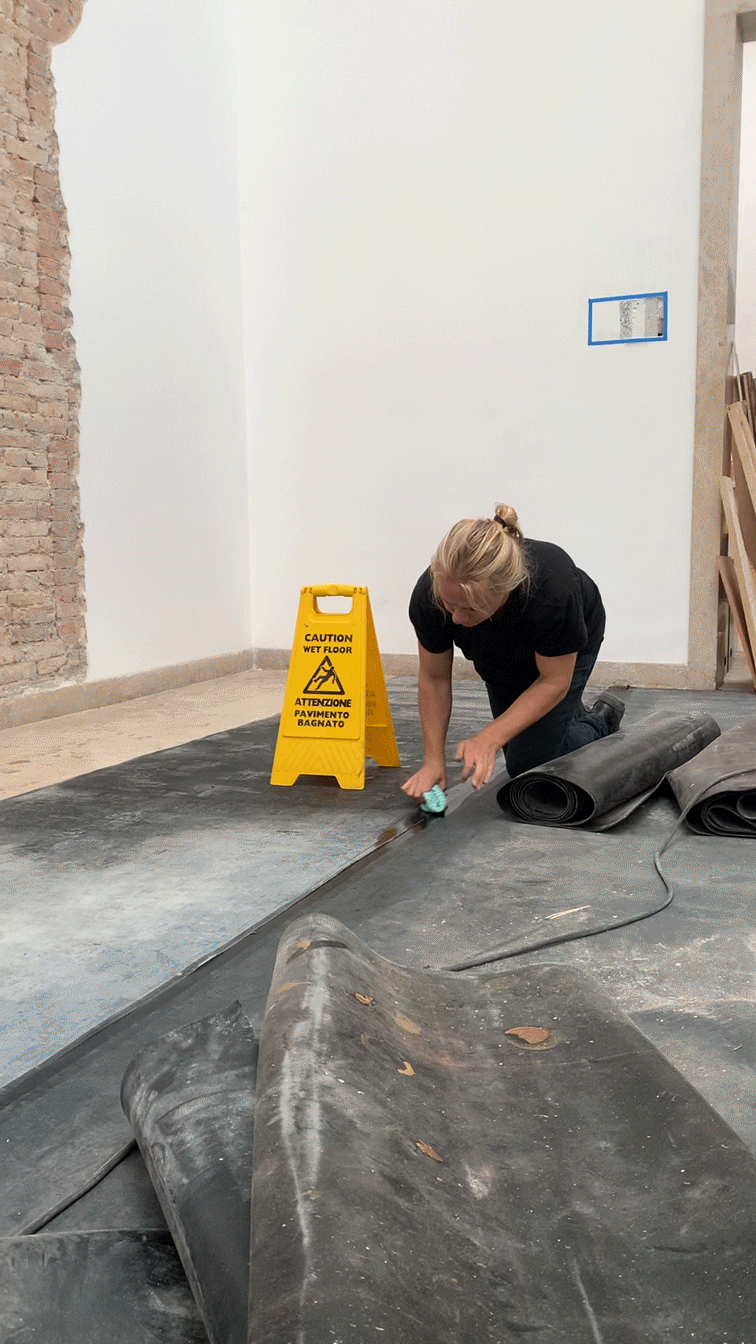

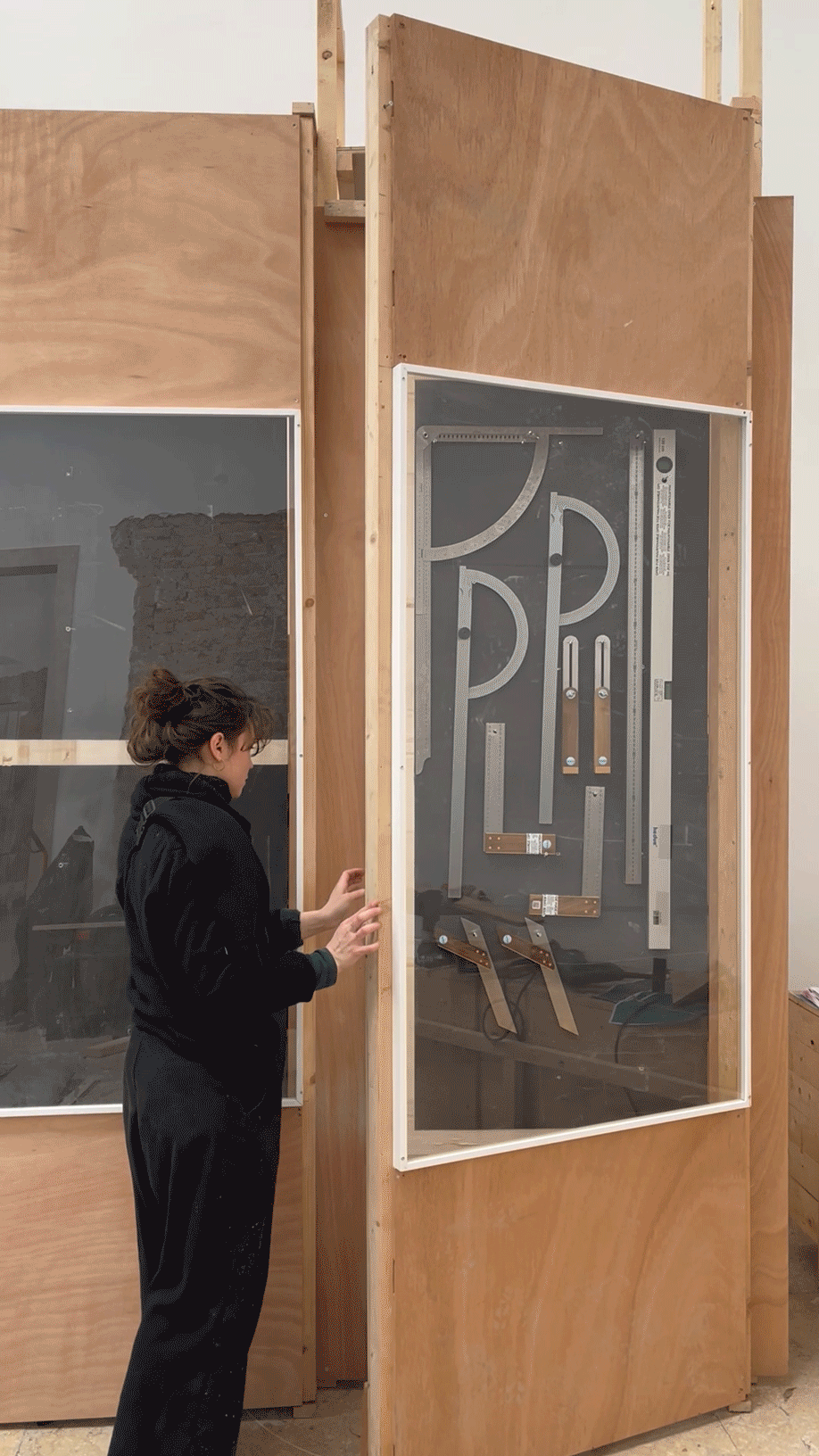

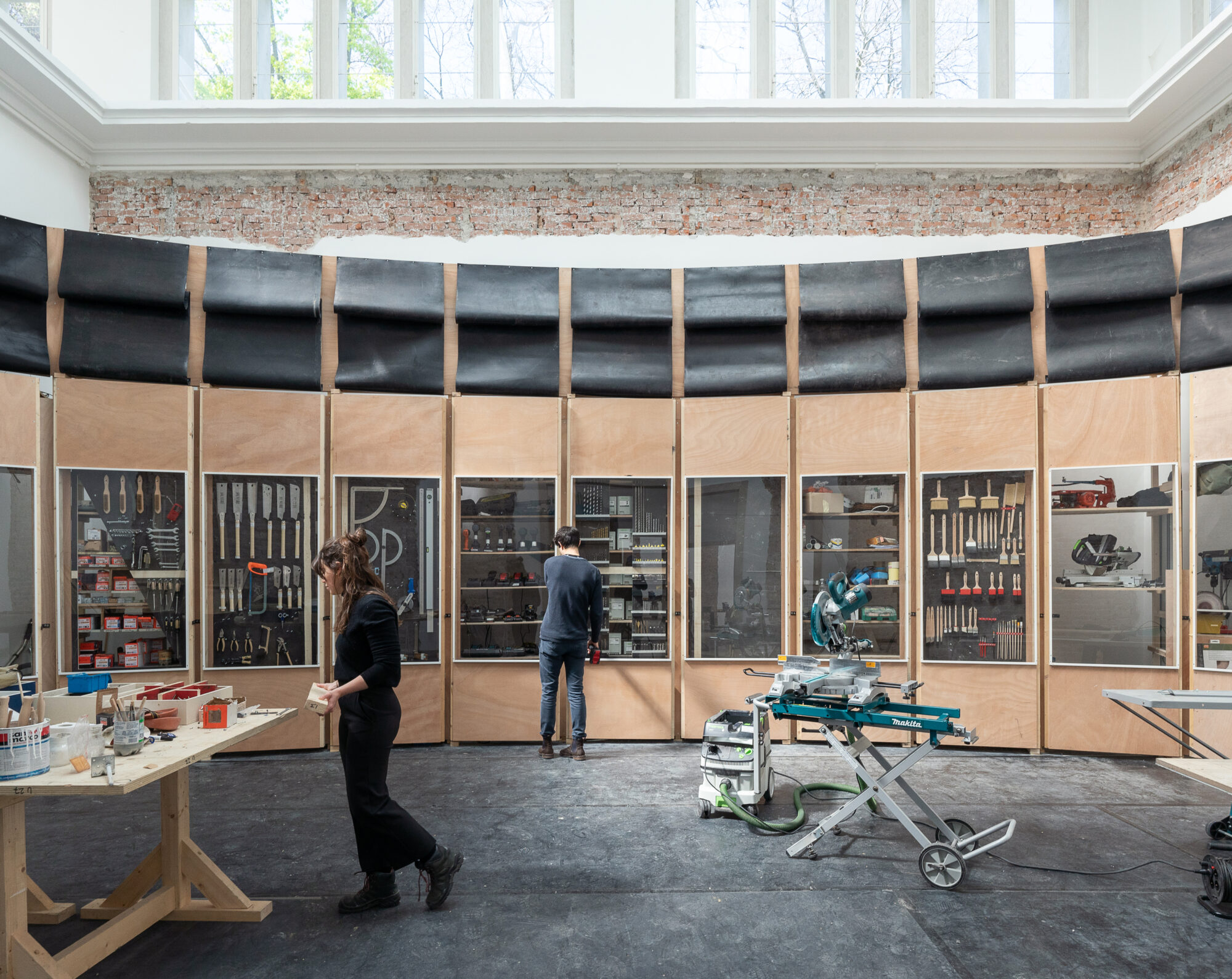

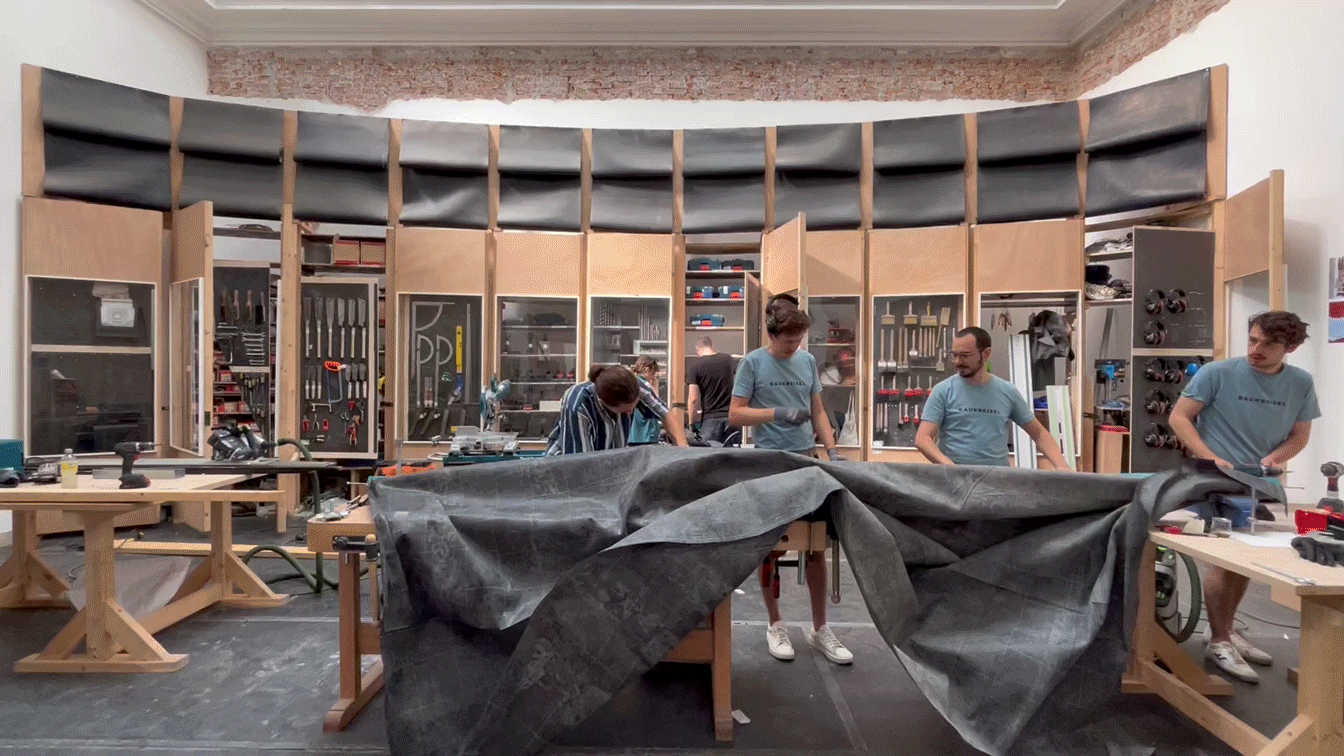



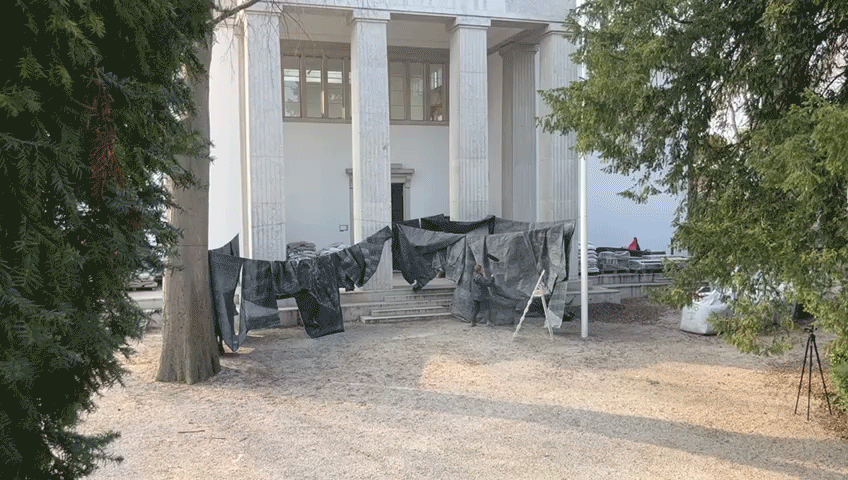



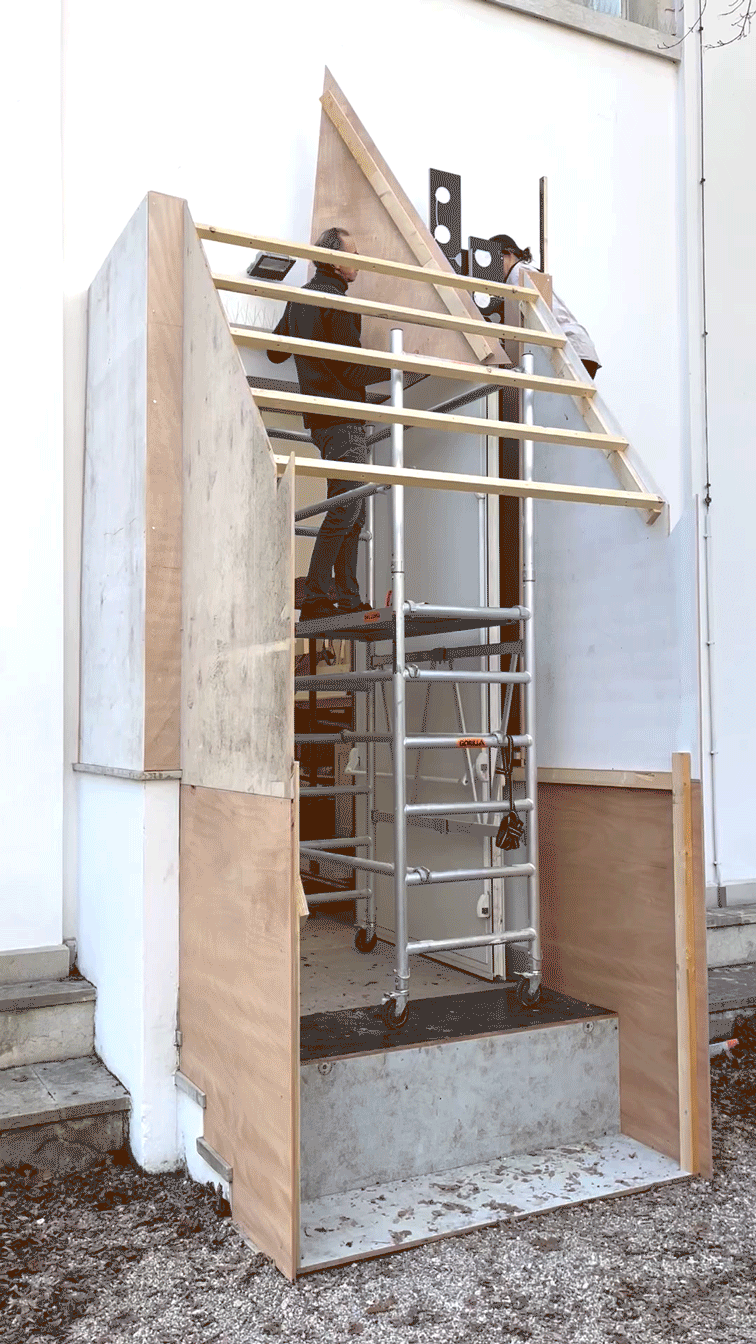

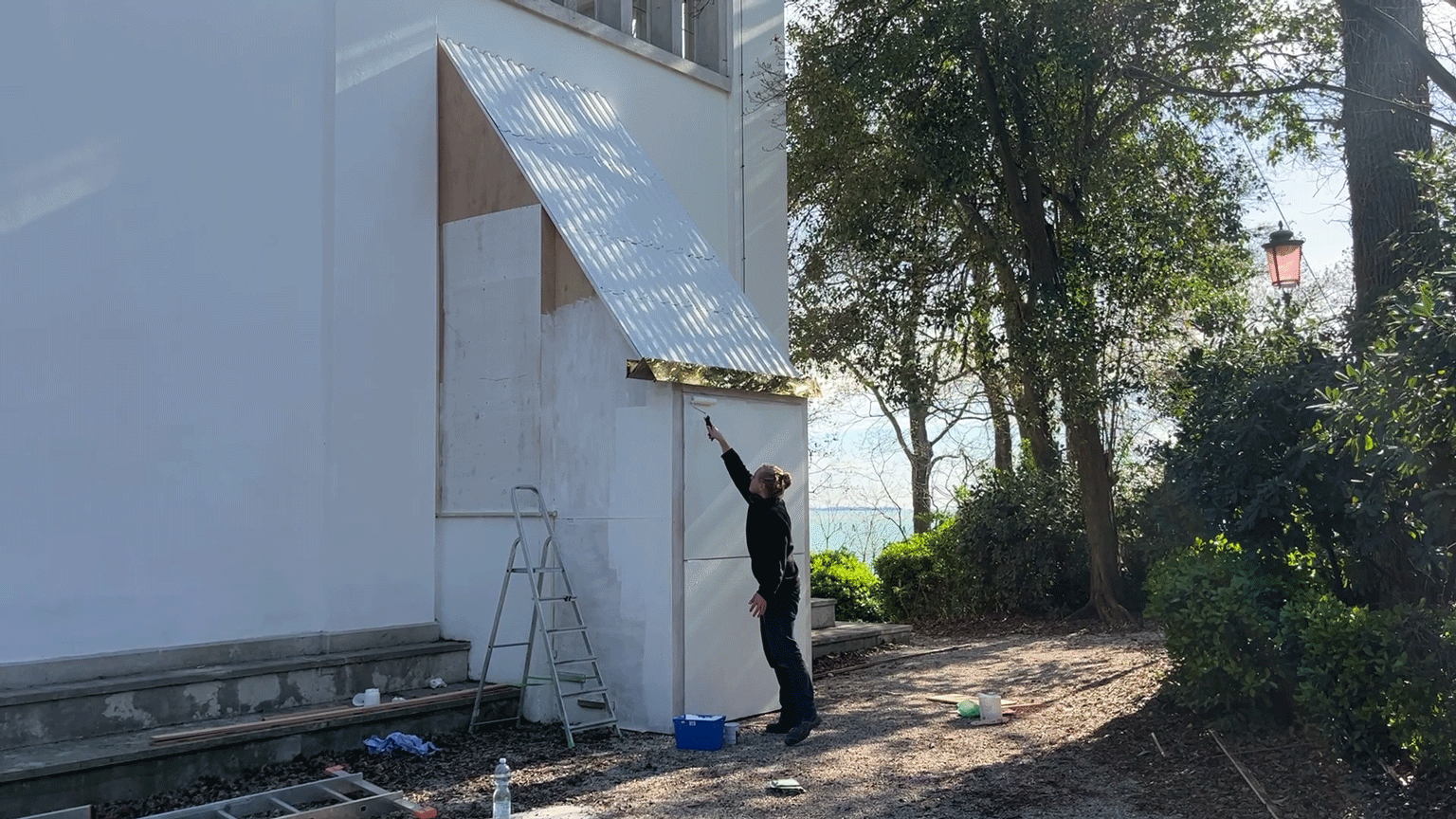








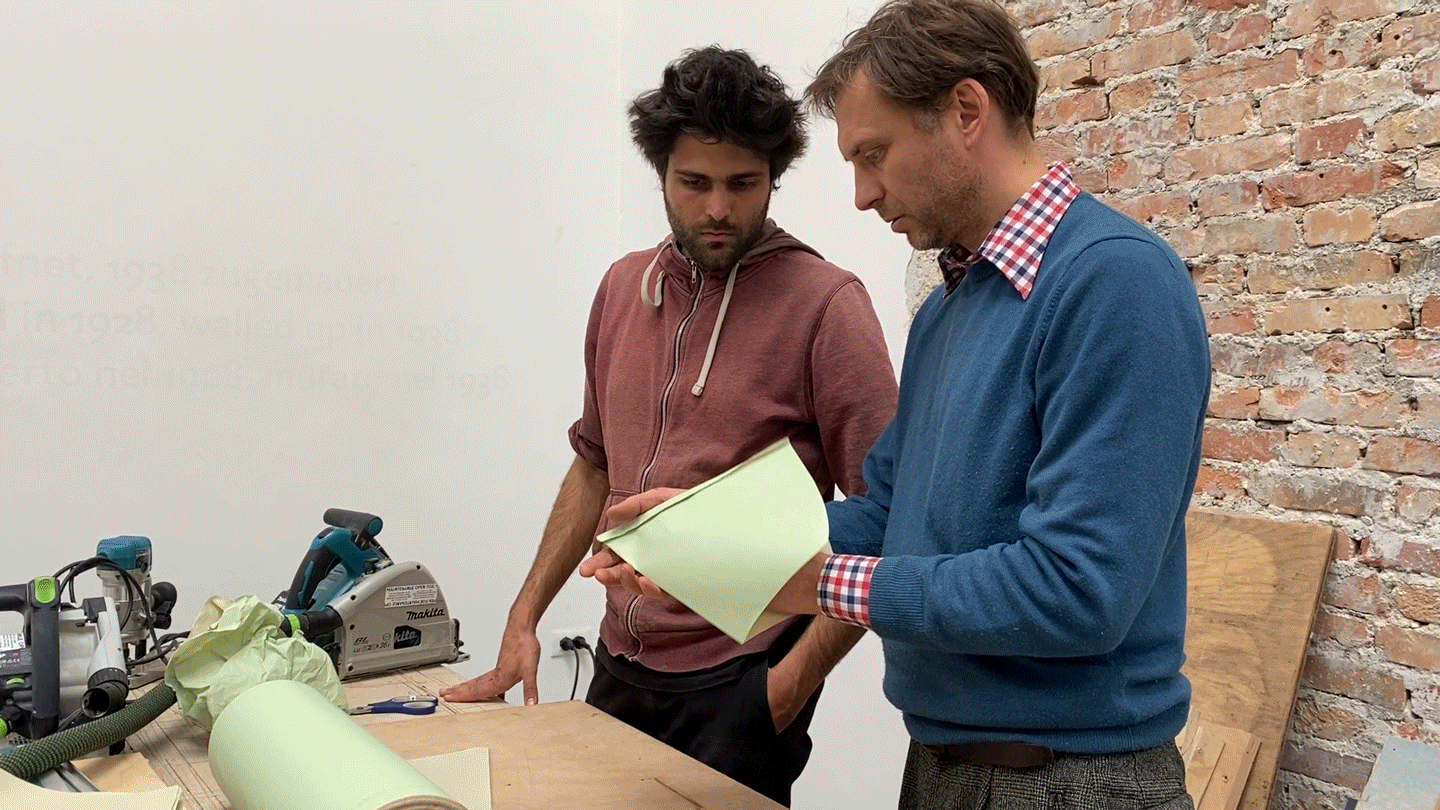
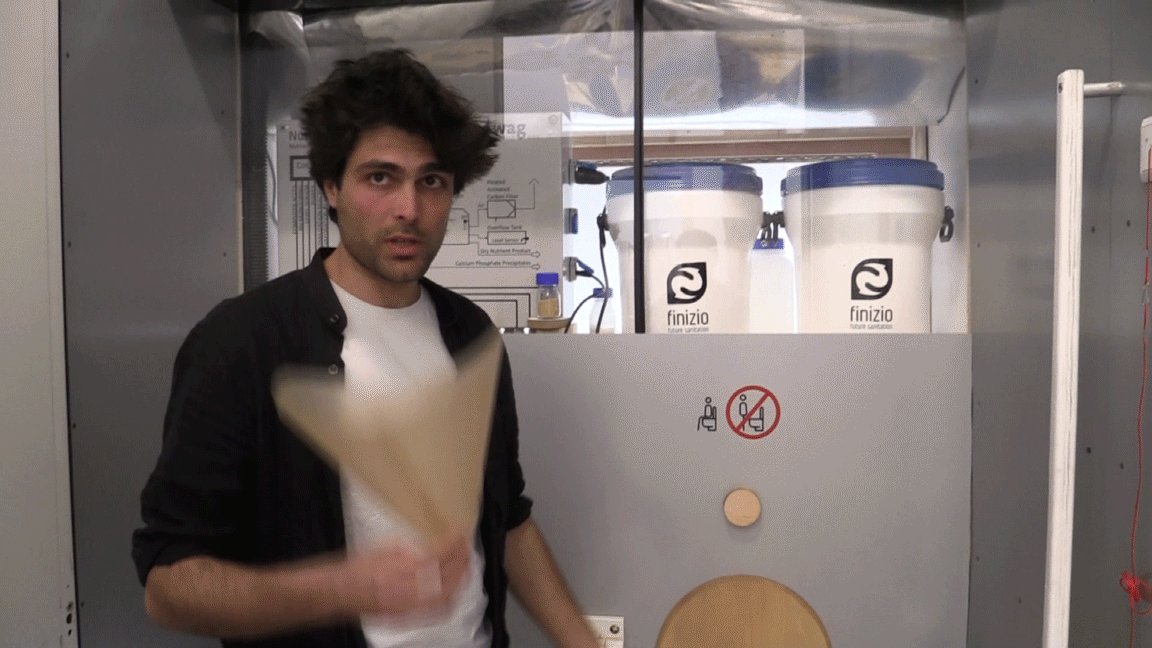

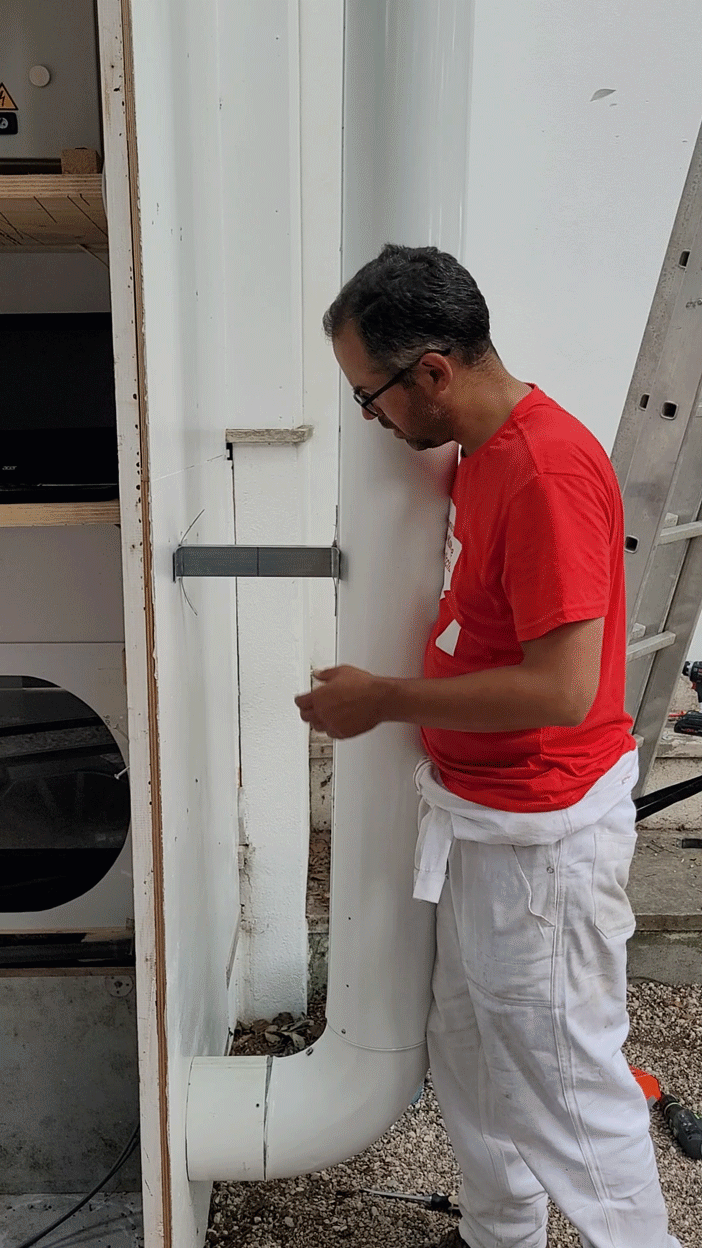



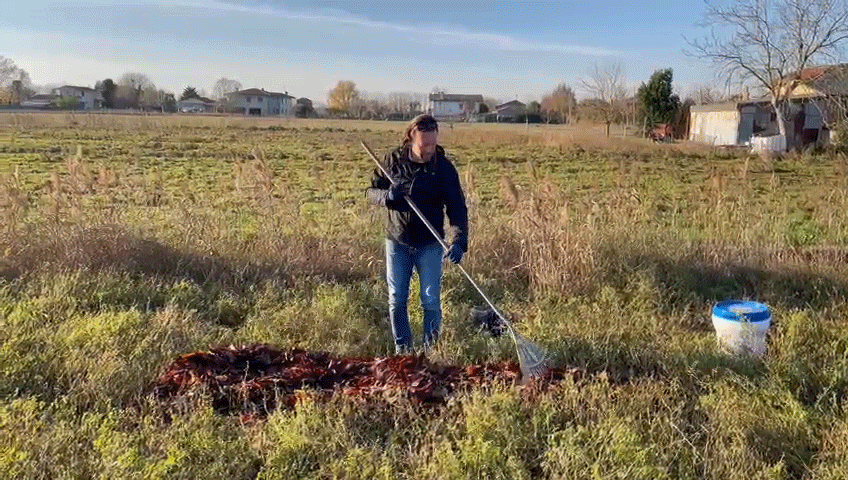



use: private house
collaborators: LDSRa
location: Brussels
country: Belgium











use: private house
location: Ghent
country: Belgium
The semi-attached house situated between a quiet street on the outskirts of Ghent and a popular birdwatching nature reservoir is standing shoulder to shoulder as the submissive counterpart to the taller and larger neighbor house. Due to the ground conditions and several previous alterations, the construction had been weakened, resulting in it starting to tilt. Rather than demolishing the building, we decided to add a supporting structure in the form of a tower. This open steel tower serves as a new gate to the property and made it possible to relocate the entrance from the ground to the first floor. The new position of the entrance also allowed us to lift the common living areas from the dark groundfloor to the two upper floors, offering the view to the green landscape behind the house as well as providing more daylight. The house is realized with an extensive use of reused elements and materials from different buildings in the area, such as windows, doors, stairs, timber, bricks, roof tiles and even insulation.










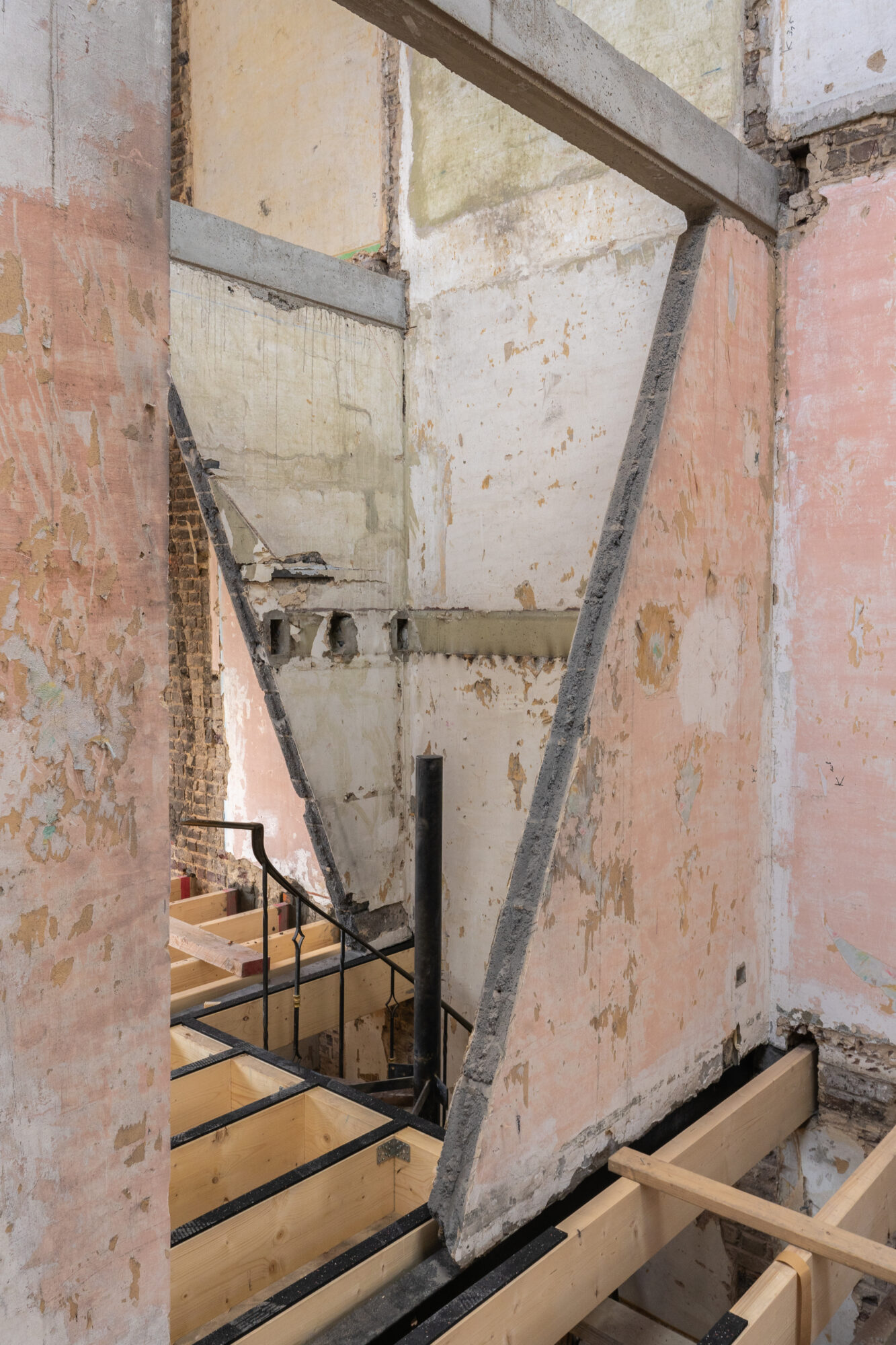

use: residential building with 27 units and a collective ground floor
collaborators: SUMMACUMFEMMER
location: Munich
country: Germany
‘San Riemo’ is the first housing project realised by the KOOPERATIVE GROSSSTADT, a cooperative founded in 2015. It is designed as a spatial infrastructure that allows for pluralistic forms of living within one robust basic structure. The possible plan of the apartments is outlined by concrete beams on the ceiling: room-units have a neutral size of 14 square meters – just big enough for a living room and not too lavish for a child’s room. Larger rooms are created by combining several room axes into one unit.
The large kitchen in the center of every unit is not purely a place for cooking, but at the same time a living entrance hall and large distribution space that allows for a non-hierarchic organization of the surrounding rooms. The spatial variety arises as the structural grid is filled with non-load-bearing drywalls. The residents themselves decided which grid axes should be filled with walls, how open the connections between rooms are, and where doors are positioned. By adding doors between appartments, the possibility of swapping rooms with neighbouring flats was implemented in several units. Many appartments also share larger rooms with neighbouring flats: sometimes up to 4 to 5 appartments share a common room that can be freely programmed.
The structure allows for flexibility in the near or far future: neutral room sizes, rooms that can be switched back and forth between different units, and the possibility to add or remove partition walls within the concrete skeleton. The heart of the house is an open communal area on the ground floor. This 4 metre high hall extends from the main entrance as an inner street through the whole house. It serves as a circulation space, laundry room, communal kitchen, library, stroller storage, workshop, and much more besides. On the way to the stairs and elevators you meet neighbours doing their laundry, baking cookies together and exchanging books.
San Riemo received the “DAM Preis 2022” of the Deutsches Architekturmuseum!













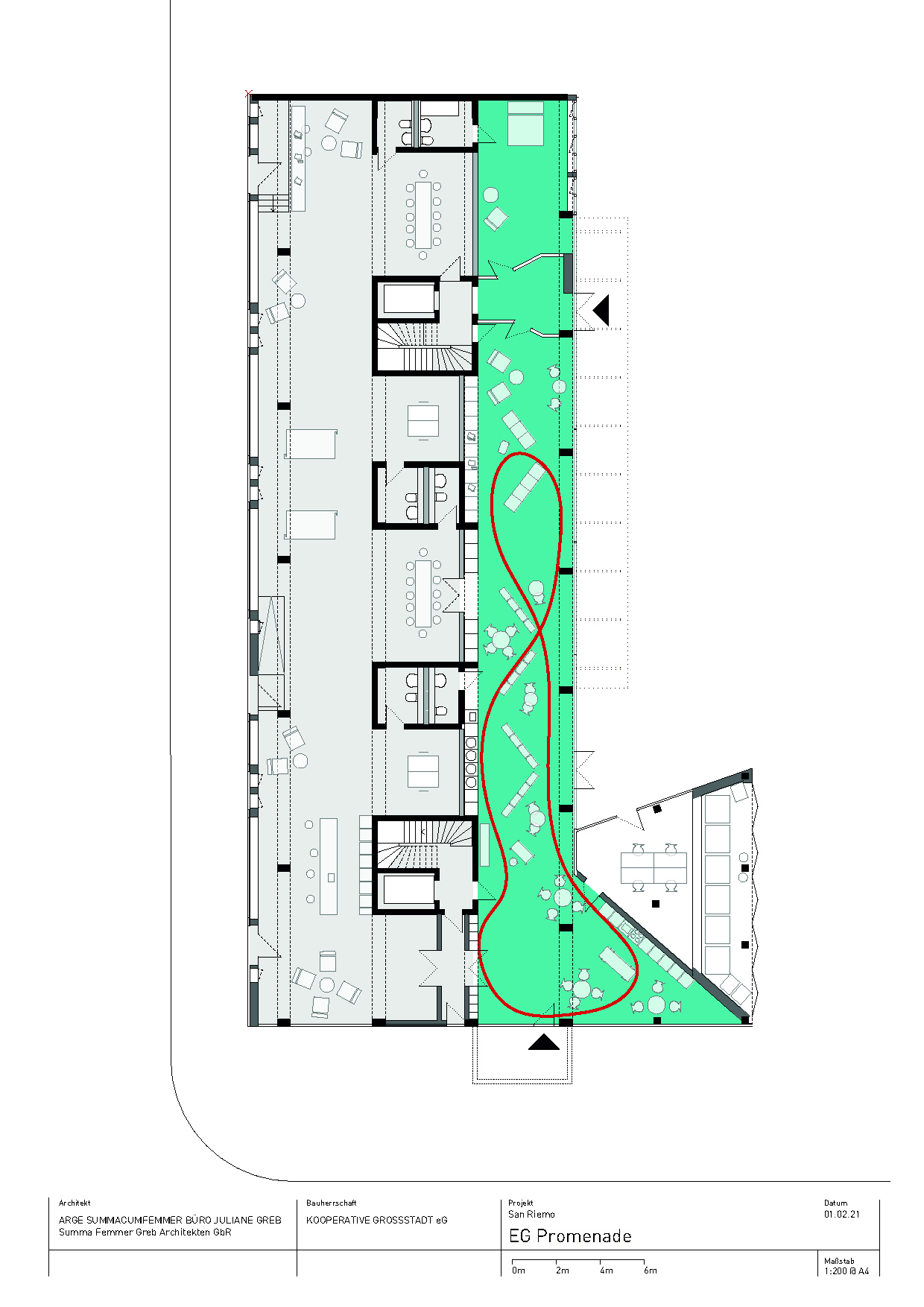
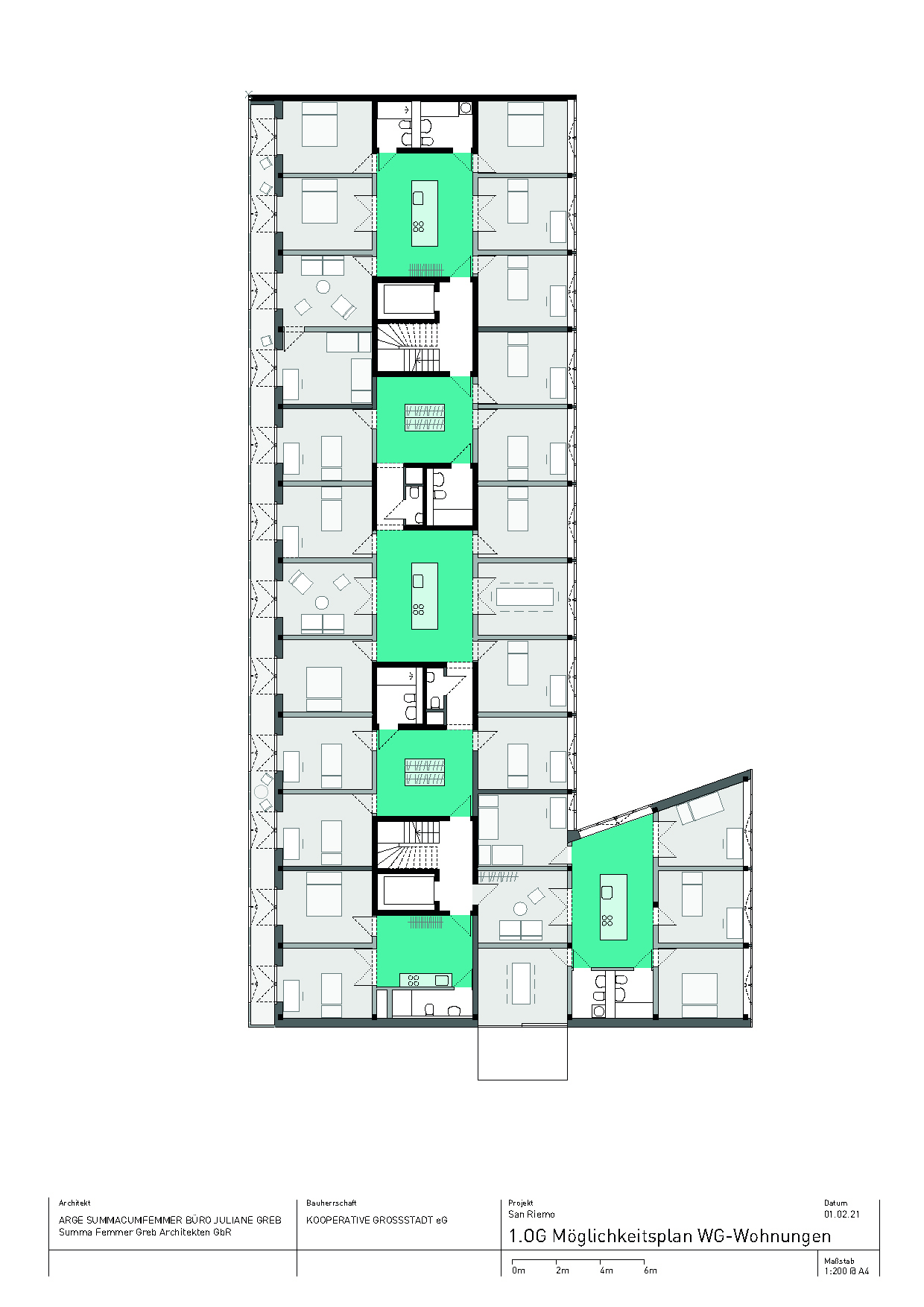
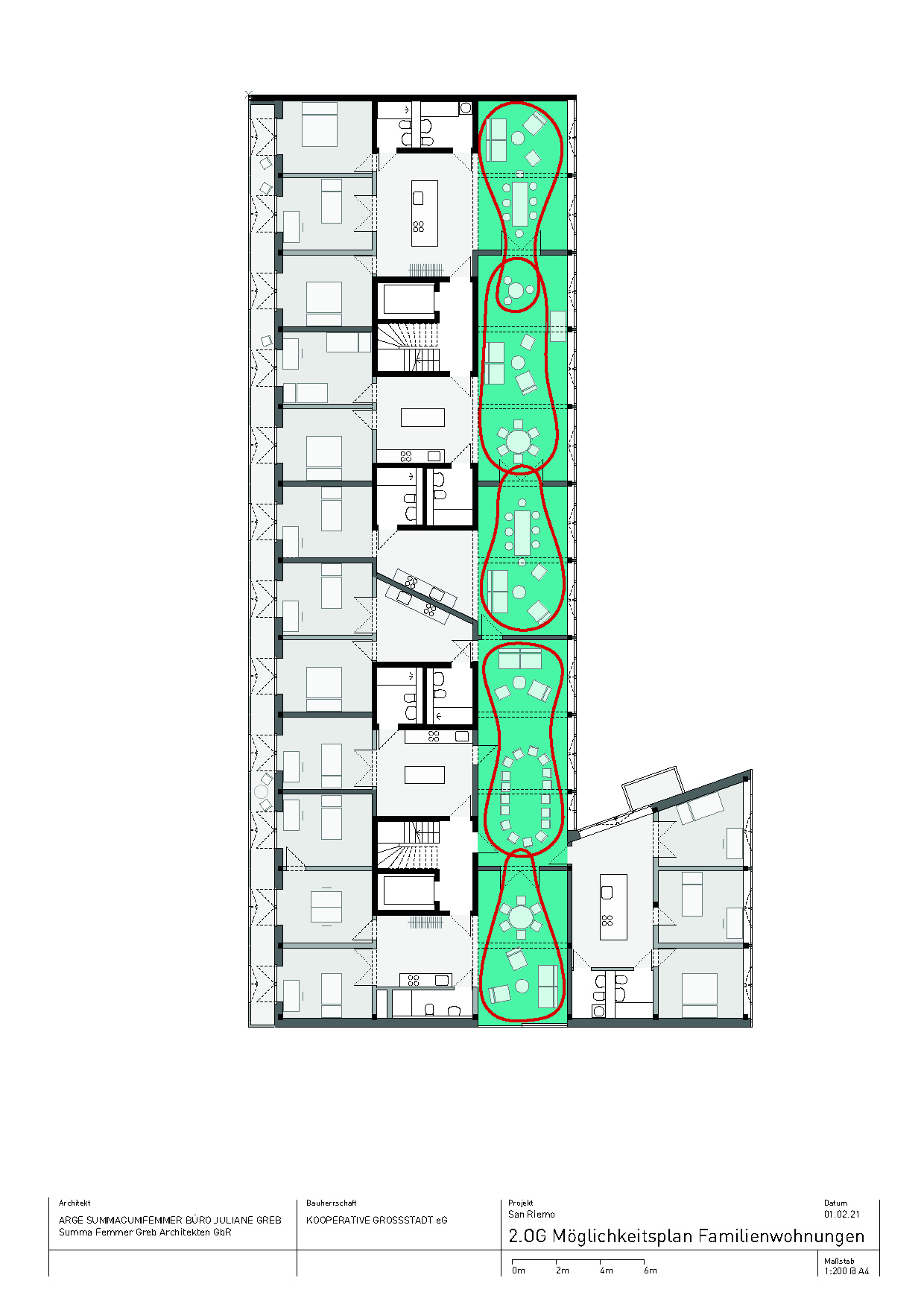
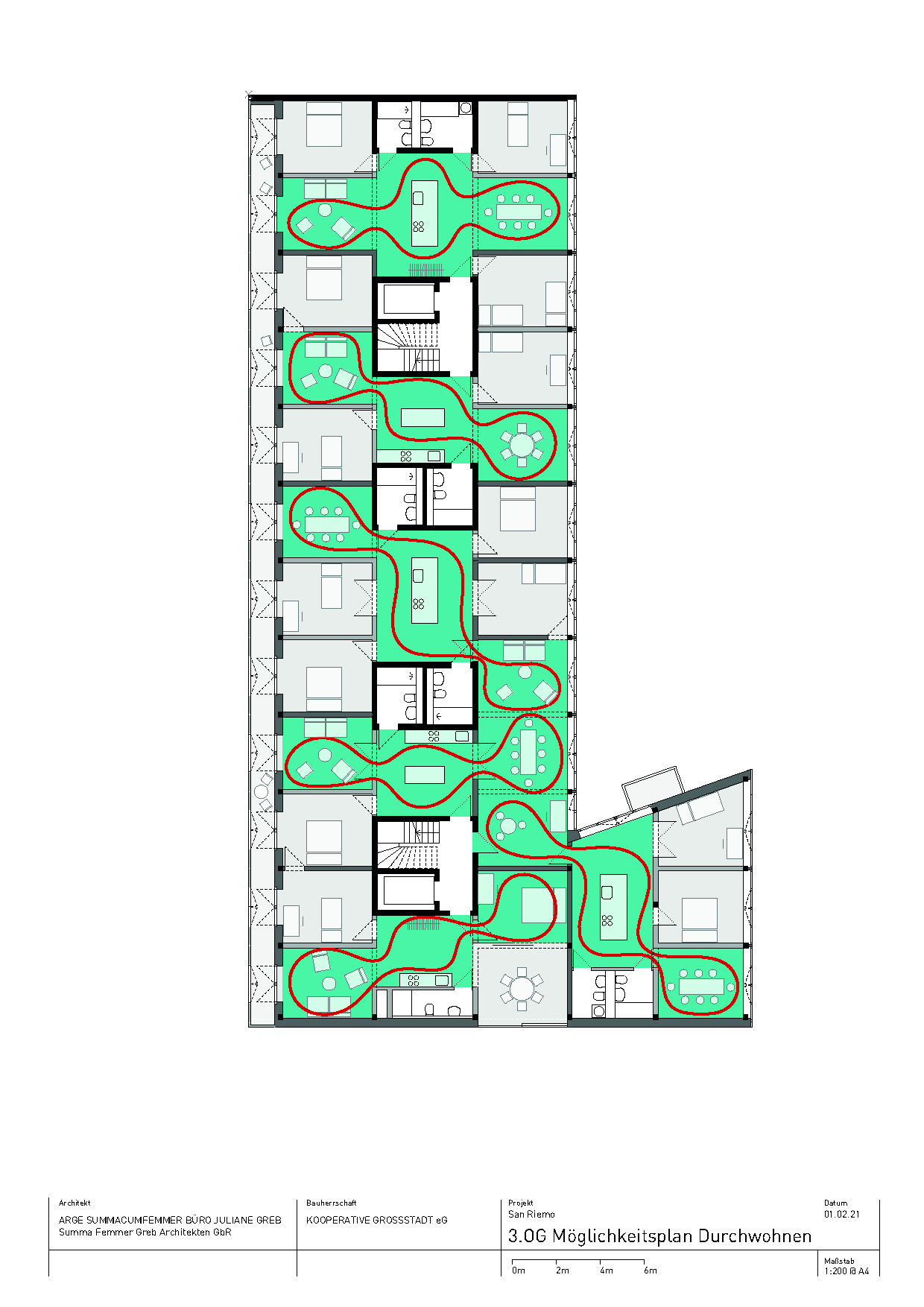




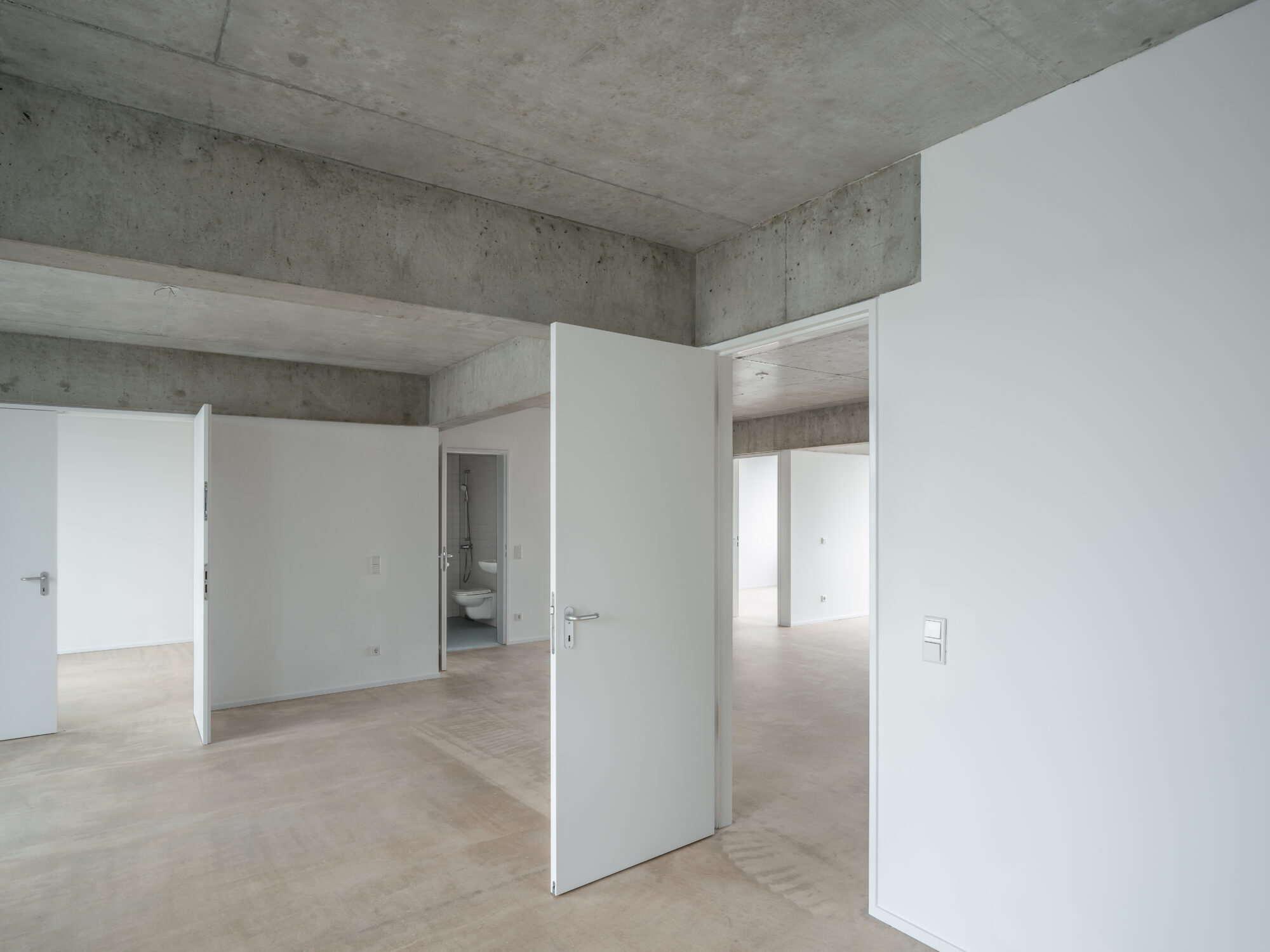











































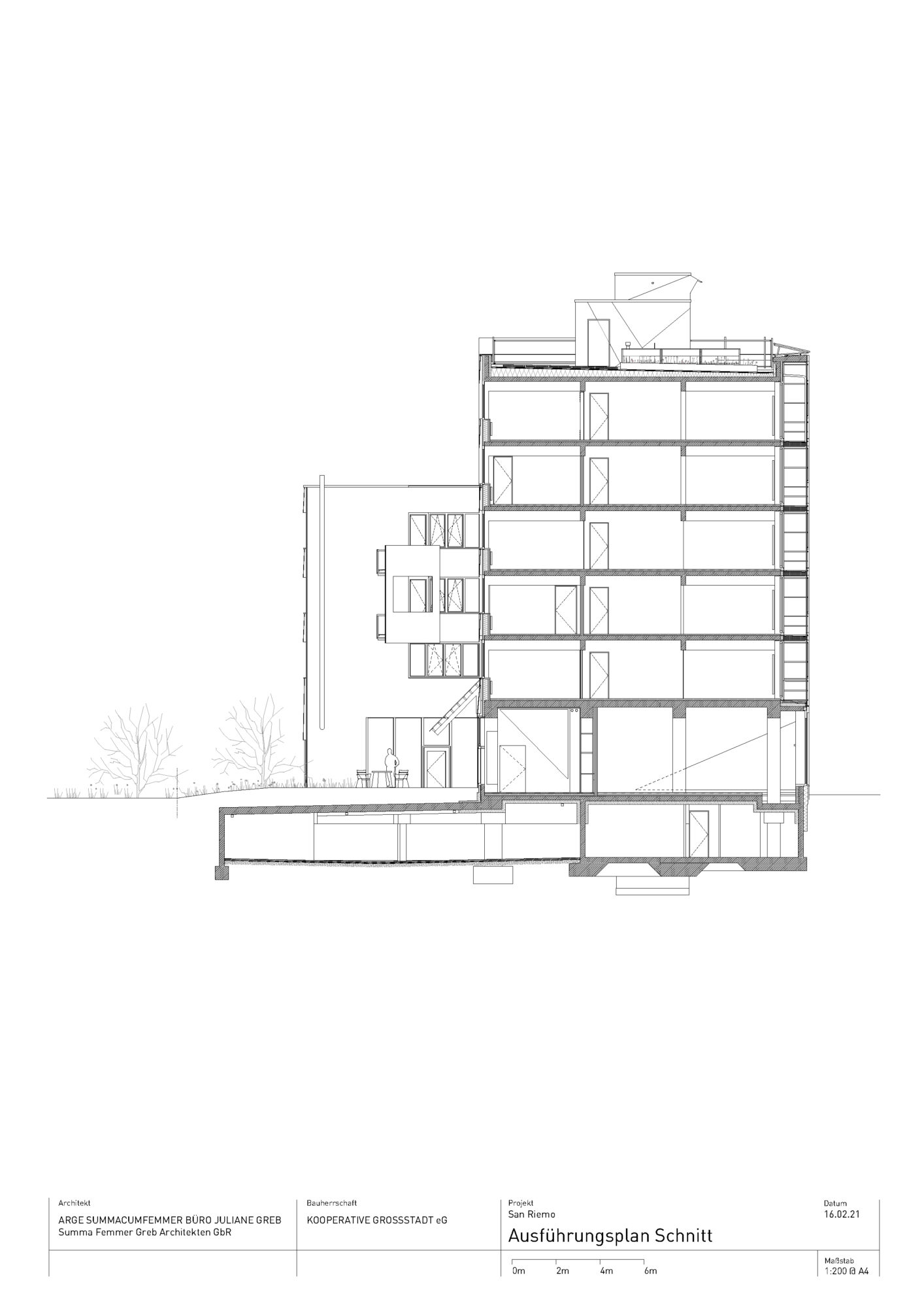



organized by ARCH+ / SUMMACUMFEMMER / BÜRO JULIANE GREB in collaboration with the Sto-Foundation’s Venice Biennale LAB and AIT-Dialog
with RWTH Aachen, University of Antwerp, UdK Berlin, TU Berlin, TU Braunschweig, BTU Cottbus-Senftenberg, PBSA Düsseldorf, Università di Genova, TU Graz, HFBK Hamburg, Leibniz Universität Hannover, TU Kaiserslautern, HfG Karlsruhe, KIT Karlsruhe, KU Leuven, MSA Münster, Università Iuav di Venezia, Bauhaus-Universität Weimar, ETH Zurich, as well as trades apprenticeship providers
location: Venice, Italy
www.openformaintenance.net
https://openformaintenance-depot.net
Instagram: @germanpavilionvenice
During the Biennale, the curators, in cooperation with the Sto-Foundation’s Venice Biennale Lab series and AIT-Dialog, organized a workshop program that seeks to prove a fundamental idea of Open for Maintenance: Only a social turn in architecture will lead us to sustainable practice. For the program, architecture students and apprentices of the trades work with local organizations on specific projects in Venice that focus on the care, repair, and maintenance of existing buildings, as well as valorization and recognition of the work involved. Participants will upgrade sanitary facilities, build ramps, design furniture for the community, paint fences, and repair roofs.
The program supports existing material and social (infra)structures counteracting the negative effects of Venice’s commercialization and actively promoting the social inclusion of underprivileged groups. The fully equipped workshop and material repository in the German Pavilion serve as a productive infrastructure and a starting point for the interventions around the city. The participants live together during the workshops’ duration, promoting dialogue which will be consolidated by a networking event in the fall of 2023.
RENOVATE A SQUATTED FLAT, Laboratorio Occupato Morion with Sto-Stiftung, Verband Farbe Gestaltung Bautenschutz Hessen, Fachschule Farbtechnik Hamburg, Staatliche Fachschule für Farbe und Gestaltung München, Ferdinand Braun Schule, Fulda – Staatliche Fachschule für Farb- und Lacktechnik, Wilhelm-Ostwald-Schule, Berlin – Oberstufenzentrum für Gestaltung, Fachschule Farb- und Lacktechnik Hildesheim, Schule für Farbe und Gestaltung, Stuttgart
BUILDING A BAR, at Laboratorio Climatico Pandora with Centro Sociale Rivolta Marghera and Sozialgenossenschaft Bellevue di Monaco, Munich
BUILDING A MOBILE TICKET BOOTH, at Campo Sportive Jacopo Reggio Lido with RWTH Aachen and IUAV Venezia
Implementing a Waterless Sanitary Infrastructure at S.a.L.E. Docks, Venice with Demo Working Group and students of MSA Münster, PBSA Düsseldorf, IUAV Venice
location: Dorsoduro, Venice, Italy
In a collective process, students from PBSA Düsseldorf, MSA Münster and Università luav di Venezia design, plan, and implement an inclusive waterless sanitary infrastructure for S.a.L.E Docks, an independent space for art and political activism in Venice.
Since 2007, the abandoned salt warehouse has been squatted by a group of activists and is now run by volunteer cultural workers, artists, and students. S.a.L.E. Docks seeks to reverse the processes of privatization of the arts by addressing a number of unresolved problems: the relationship between cultural capital and increasing precarity, the neoliberal use of art as a means to contain critical imagination and thinking, as well as the interdependency of art, finance, real estate, and gentrification.
Like many other squats in Venice, S.a.L.E. docks lacks proper sanitary infrastructure; access to municipal services is conditioned on legal tenancy or ownership. The project is therefore based on a waterless system and be realized with left-over material from the Biennale Arte 2022. Students experiment in planning without exact knowledge of the available material as well as dealing with the social issues connected to the topic of personal hygiene, like dis_ability and gender and race.
REPAIRING A COMMUNITY CENTER at Portineria di Quartiere Mestre with Biennale Urbana Venice, ETICity Venice, Deutsche Werkstätten Hellerau, UdK Berlin and IUAV Venezia
PRESERVING AND MAINTAINING AGRICULTURE AND VEGETATION on Vignole Island with VERAS, TU Berlin and IUAV Venezia
MAINTAINING EXISTING COMMUNAL SPACES in Santa Marta with Assemblea Social per la Casa Venezia, BTU Cottbus-Senftenberg, Stadt. Berufsschule für Holztechnik und Innenausbau Munich and IUAV Venezia
BELLE ETTAGE BELLE ALTANA at S.a.L.E. Docks with KU Leuven and IUAV Venezia
CREATING A MEETING PLACE at Campo Sportivo Jacopo Reggio Lido with ETH Zürich, Universiteit Antwerpen and IUAV Venezia
TRASHLATION – UPCYCLING VIGNOLE LABORATORY with VERAS, IUAV Venezia and Rebiennale/R3B
MAINTAINING THE GERMAN PAVILION with Alanus Hochschule Alfter and IUAV Venezia
MAINTAINING SPACES FOR WINEMAKING at San Michele Island with Laguna net Bicchiere Venice, RWTH Aachen and IUAV Venezia
REPAIRING A SOCCER CLUB at Campo Sportivo Jacopo Reggio Lido, RPTU Kaiserslautern and IUAV Venezia
SPREAD THE READING PROJECT on Giudecca Island with Rebiennale/R3B, RPTU Kaiserslautern and IUAV Venezia
REPAIRING A SHIPYARD at Cantiere Nautico Casaril with Università di Genova, AdbK Munich and IUAV Venezia
PUBLIC DESIGN SUPPORT at Casette neighborhood with Assemblea Sociale per la Casa Venezia, HFBK Hamburg and IUAV Venezia
MAINTAINING A COMMUNITY GARDEN in Santa Marta with Assemblea Sociale per la Casa Venezia, Leibniz Universität Hannover and IUAV Venezia
RENOVATING A COMMON MEETING SPACE at Spazio Punch with Baukreisel e.V. Berlin, TU Graz, KIT Karlsruhe and IUAV Venezia
RESTORING A BOAT at FAP Cantiere Nautico with Il Viaggio di Scoperta Venice, TU Graz and IUAV Venezia
SPECULATIVE FUTURES: VENICE CASE with AHO Oslo and IUAV Venezia
UTOPIA AS PRACTICE with HfG Karlsruhe, HfK Bremen, ABK Stuttgart and IUAV Venezia
LA CASA DI MARTINA at Casette neighborhood with Assemblea Sociale per la Casa Venezia, Rio Terà dei Pensieri Venice, Bauhaus-Universität Weimar, TU Darmstadt and IUAV Venezia
AS FOUND with Laboratorio Climatico Pandora Mestre, Universiteit Antwerpen and IUAV Venezia
REPAIRING AT THE EDGE OF A CLOISTER with Associazione Chiostro a Sant’Elena, Laguna nel Bicchiere Venice, UdK Berlin and IUAV Venezia
DESIGN TO COMFORT with Centro Sociale Rivolta, Associazione Red Carpet For All, TU Braunschweig and IUAV Venezia
REPAIR + CARE SERVICE with Laboratorio Climatico Pandora Mestre, Universität Siegen and IUAV Venezia

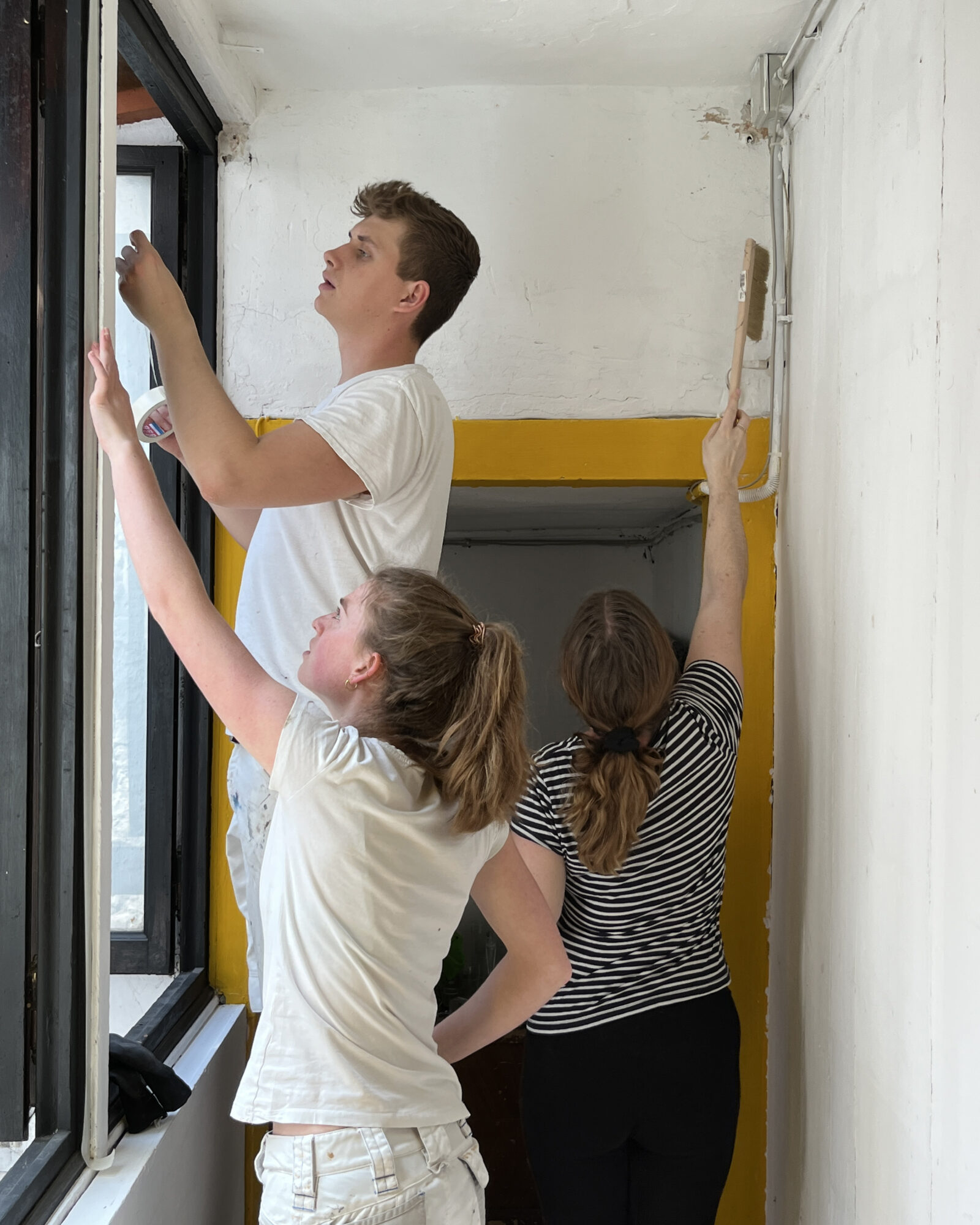




























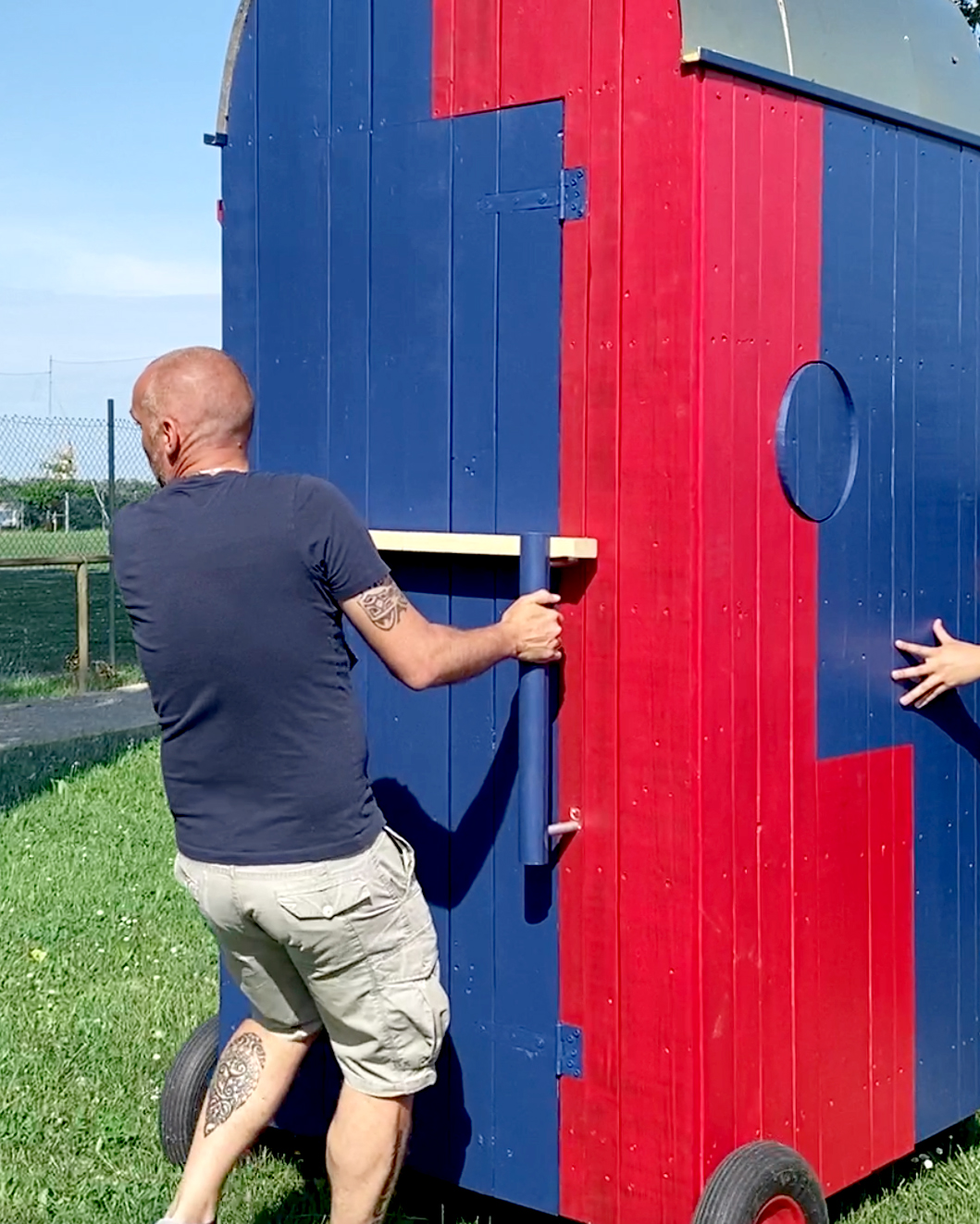

















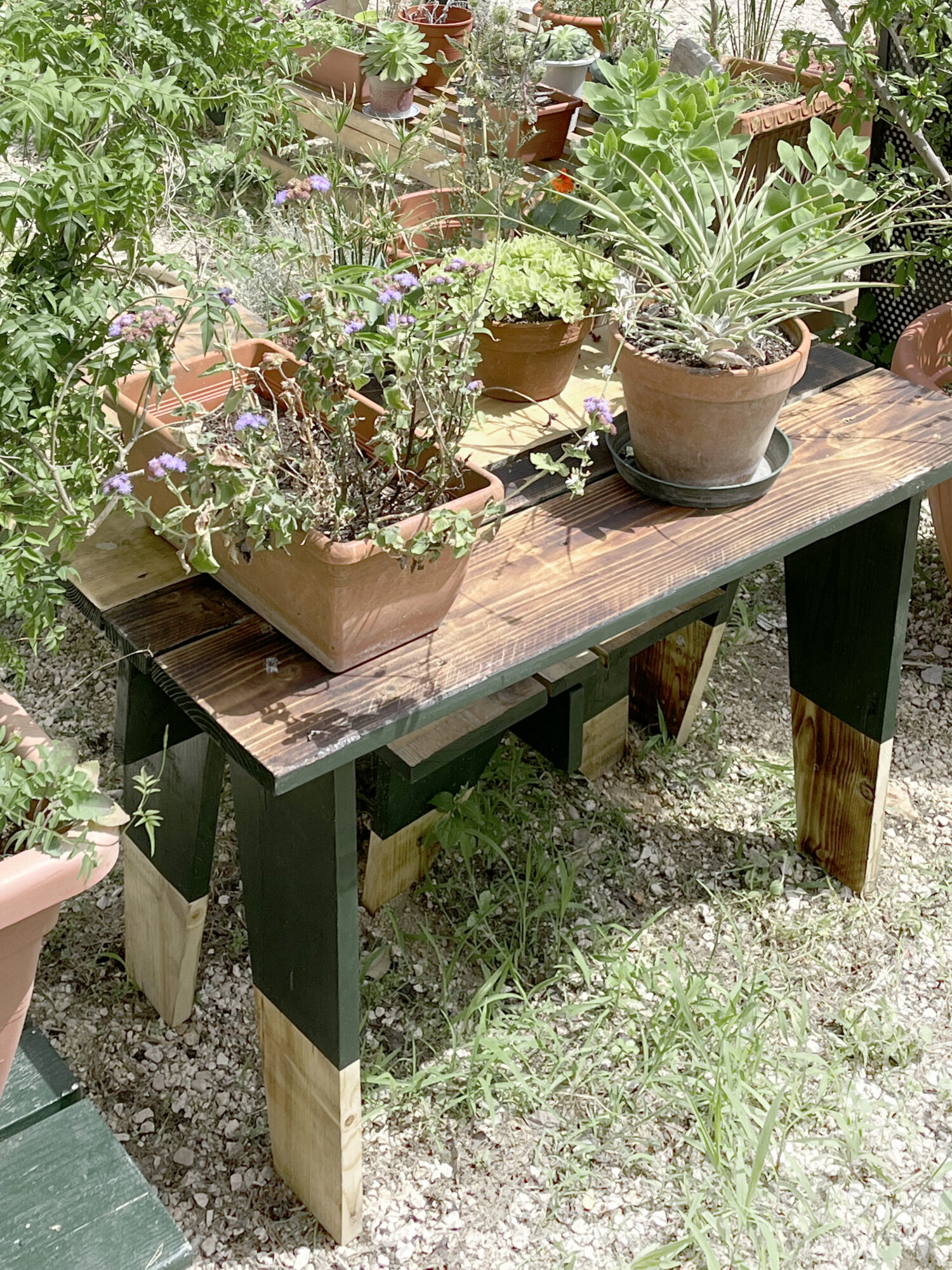



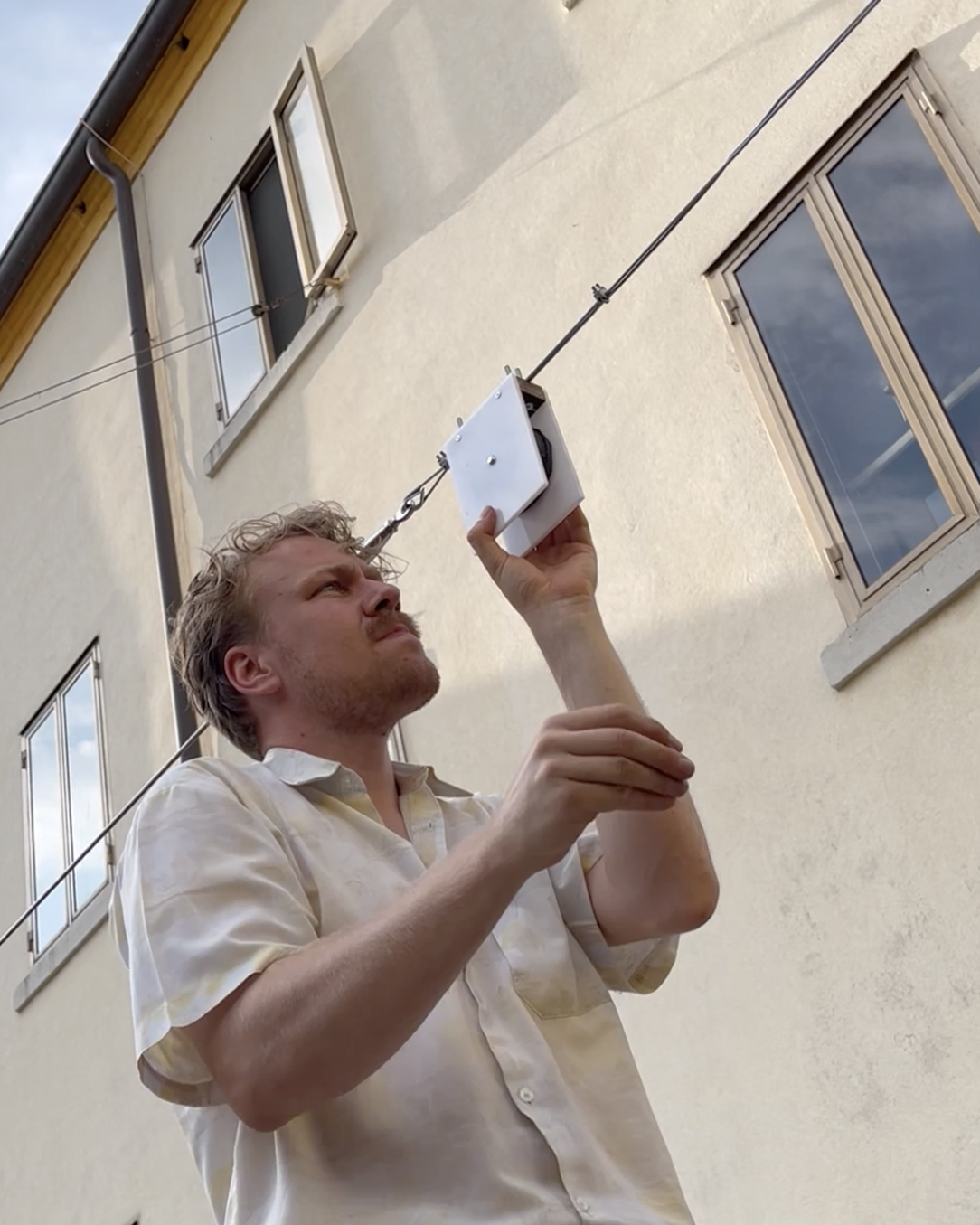












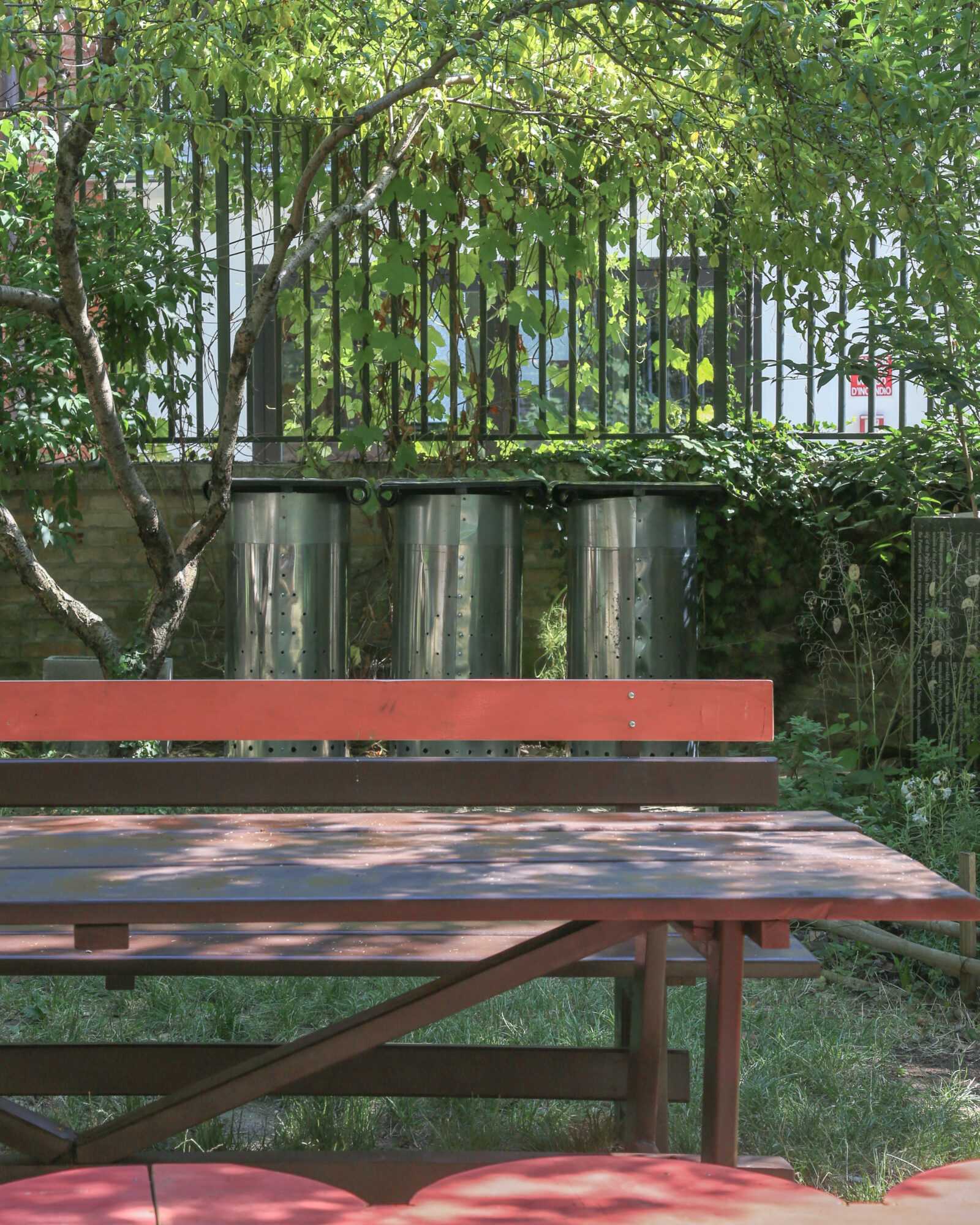















































































































































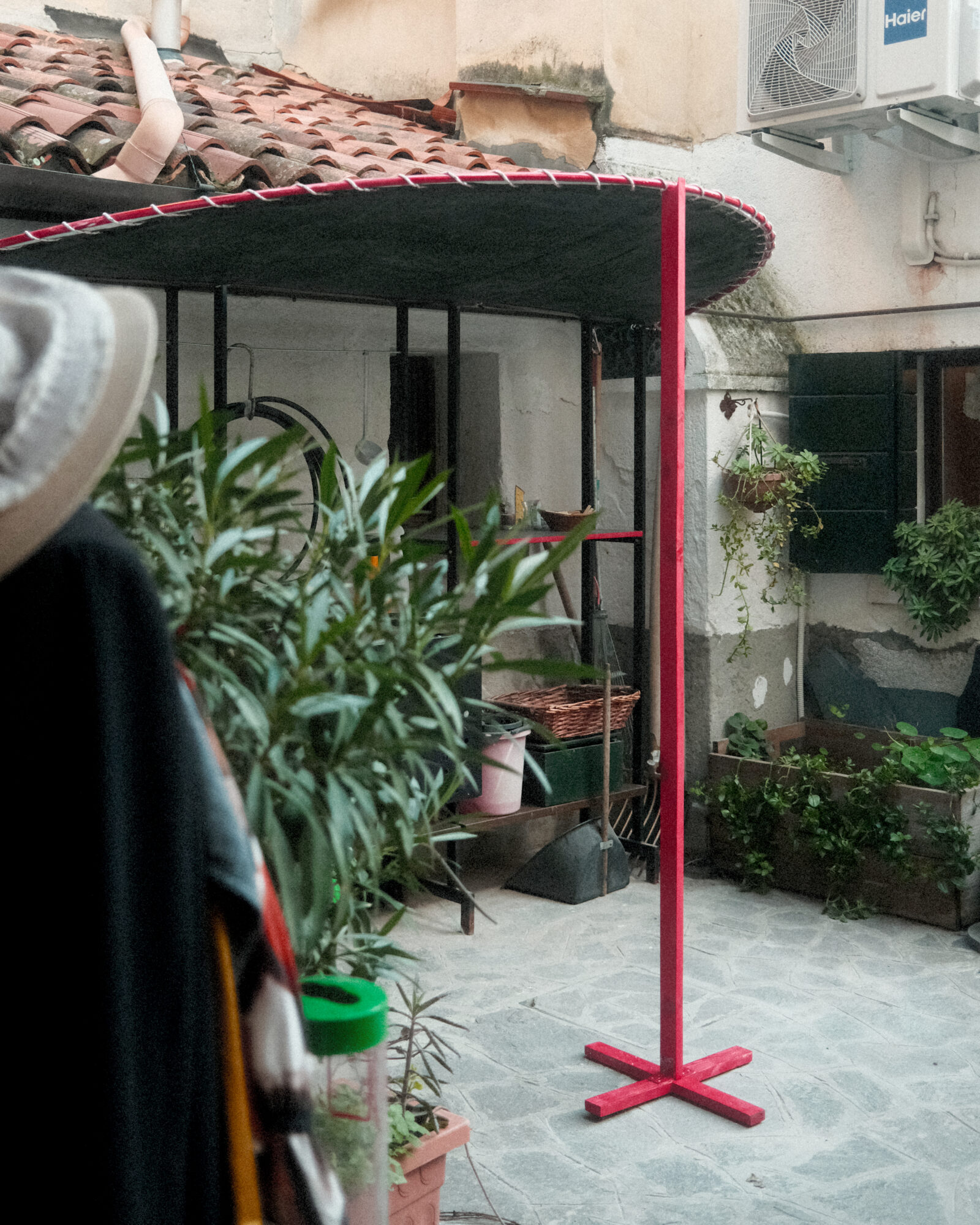


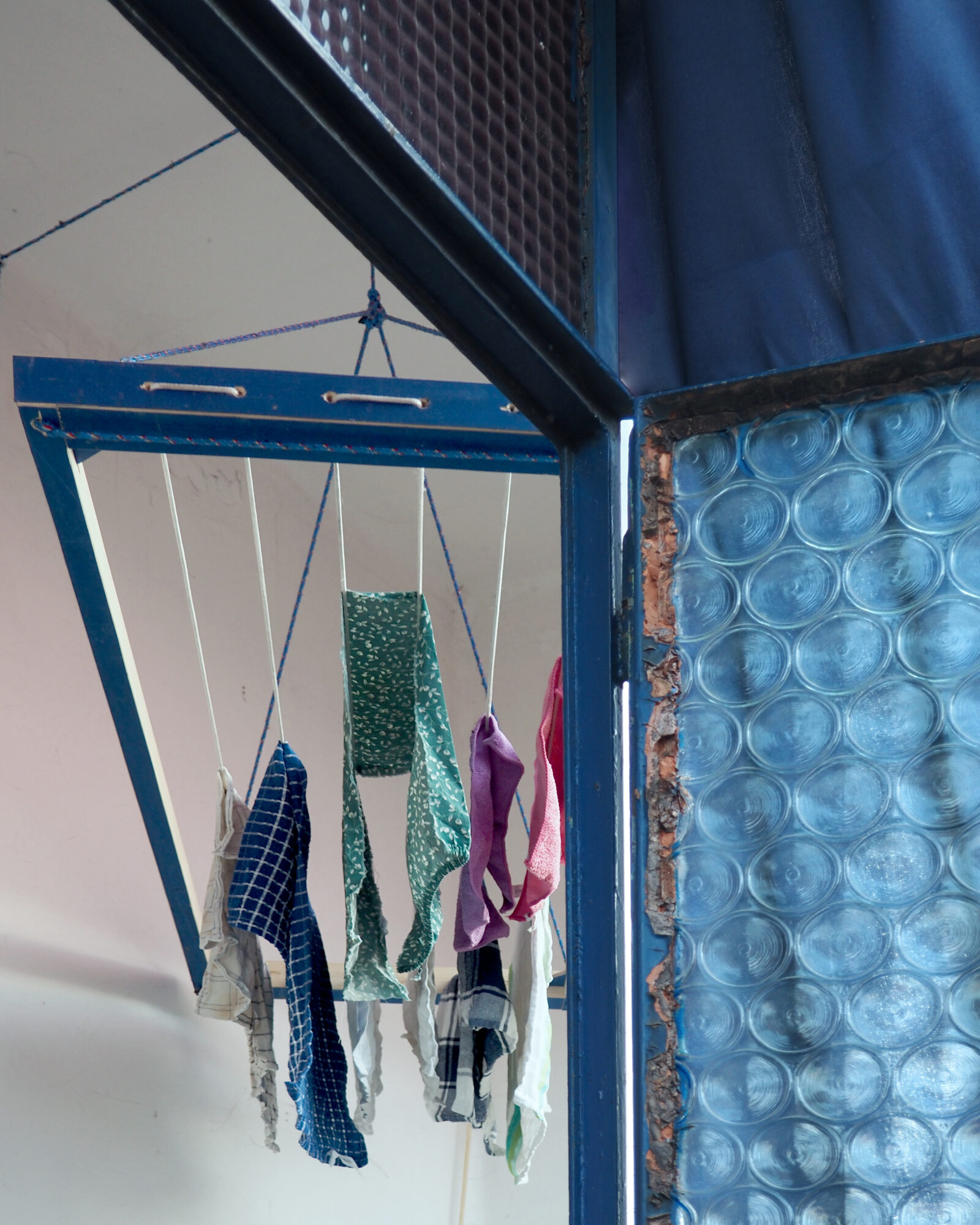










use: coffee roasters and wood workshop
location: Ghent
country: Belgium
VDK&C4 factory is a common work-, production- and above all meeting place for two small companies. The project is situated on the outskirts of the city on an industrial site dominated by concrete industrial halls. Without denying the context, the building on the prominent corner plot tries to counteract the anonymity of the surrounding buildings, creating a recognizable “place”. By shifting color, composition and form, typical elements and materials from contemporary industrial construction are abstracted, so that they acquire a new peculiar character. Heart of the building is a triangular courtyard, which breaks the rational rectangular shed, creating a collective meeting space and providing the interior spaces around with light and a view into the greenery. The garden divides the building into three parts: the joinery, the coffee roaster and a storage area. On top of the lower storage area is a communal roof terrace, which can be used by both parties.



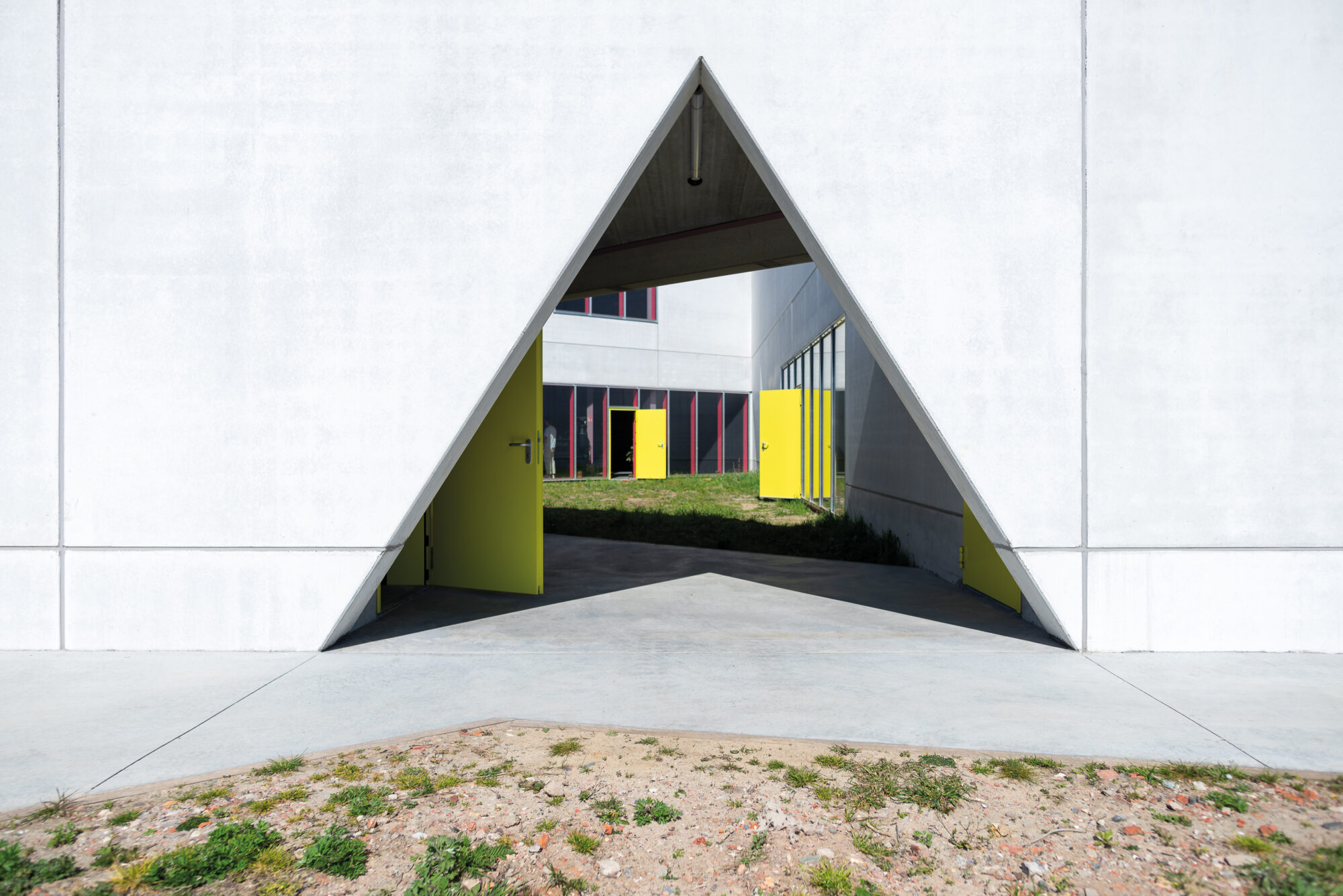
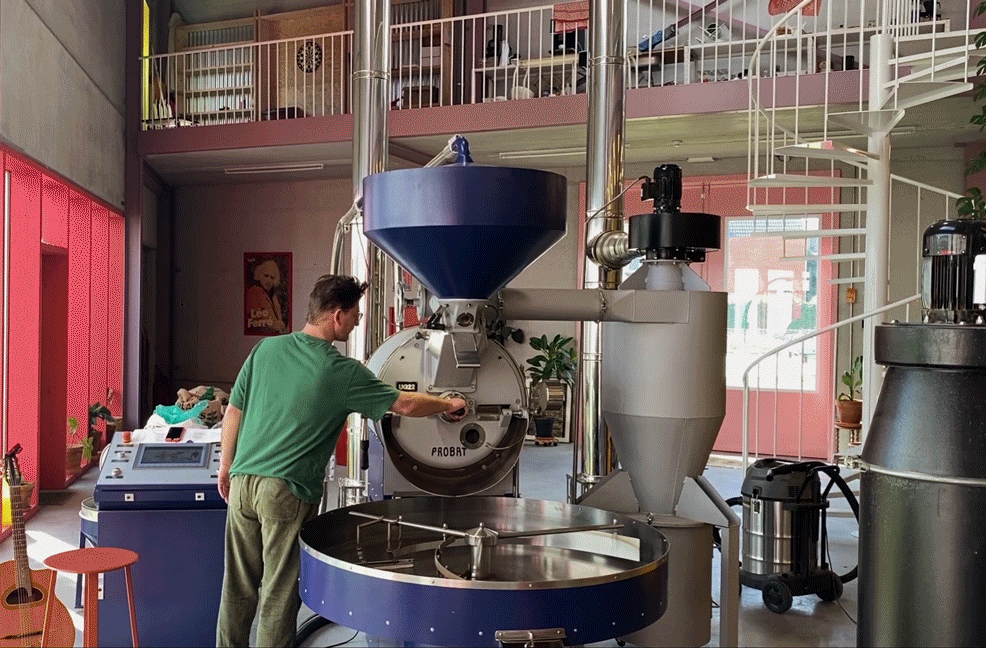










use: clubhouse
collaborators: DEMO WORKING GROUP
location: Cologne
country: Germany
Located in the fields on the edge of the city, Meschenisch is a place strongly associated with its large-scale housing development from the seventies – which became famous for its severe social problems in the past. The Sport Club Meschenisch, as a meetingpoint for children and young people is of great importance for the social integration of a huge diversity of cultural and social backgrounds. Despite the extremely tight, publicly funded budget, the new clubhouse presents itself confidently and optimistically and offers a clear identification for the young people and adults of the neighborhood. The compact and wheelchair accessible building offers changing rooms, sanitary facilities, offices, and a multifunctional club room inside. A wide outside staircase offers space for spectators of the football game.











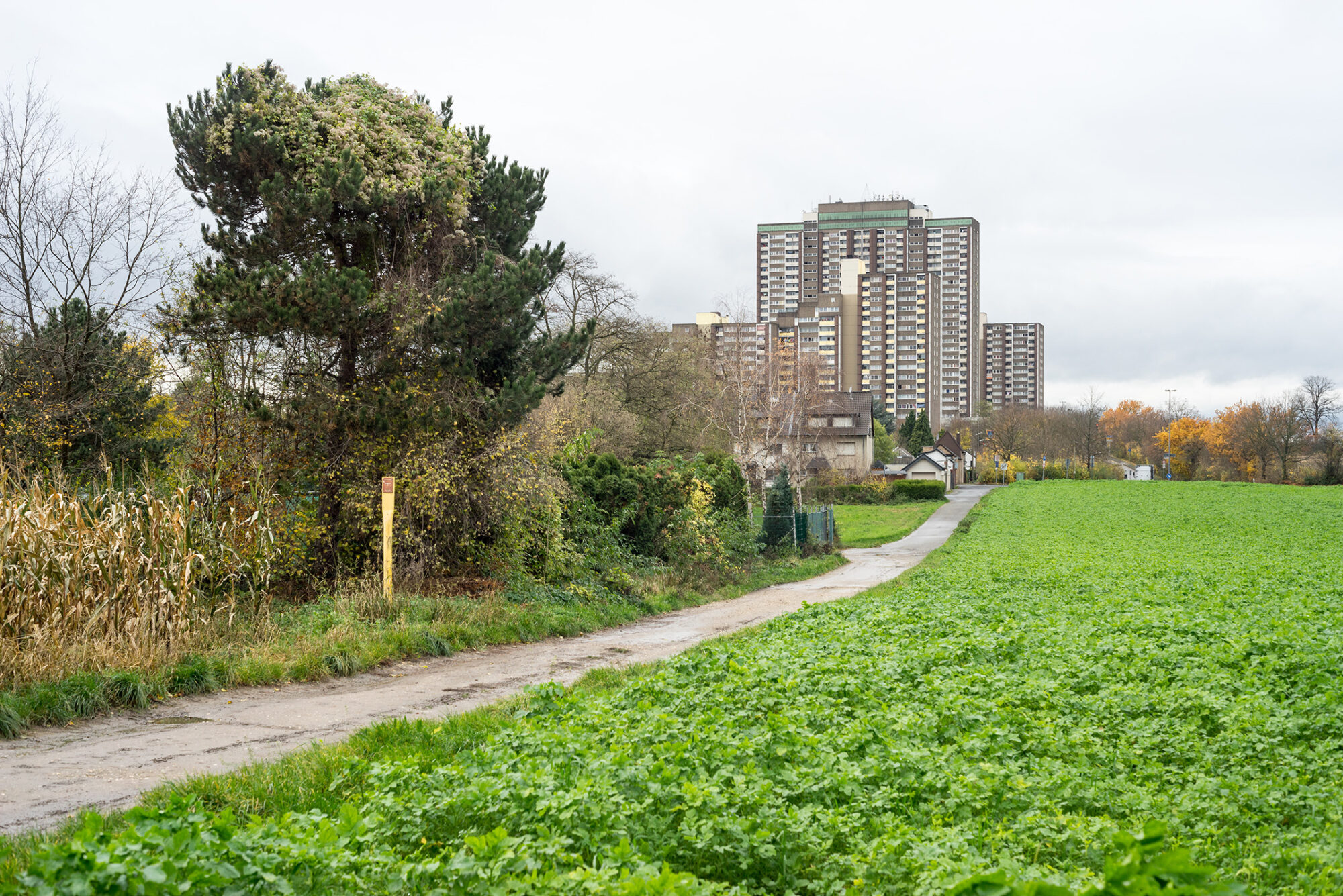


use: private house
location: Ghent
country: Belgium

















use: private house
location: Ghent
country: Belgium





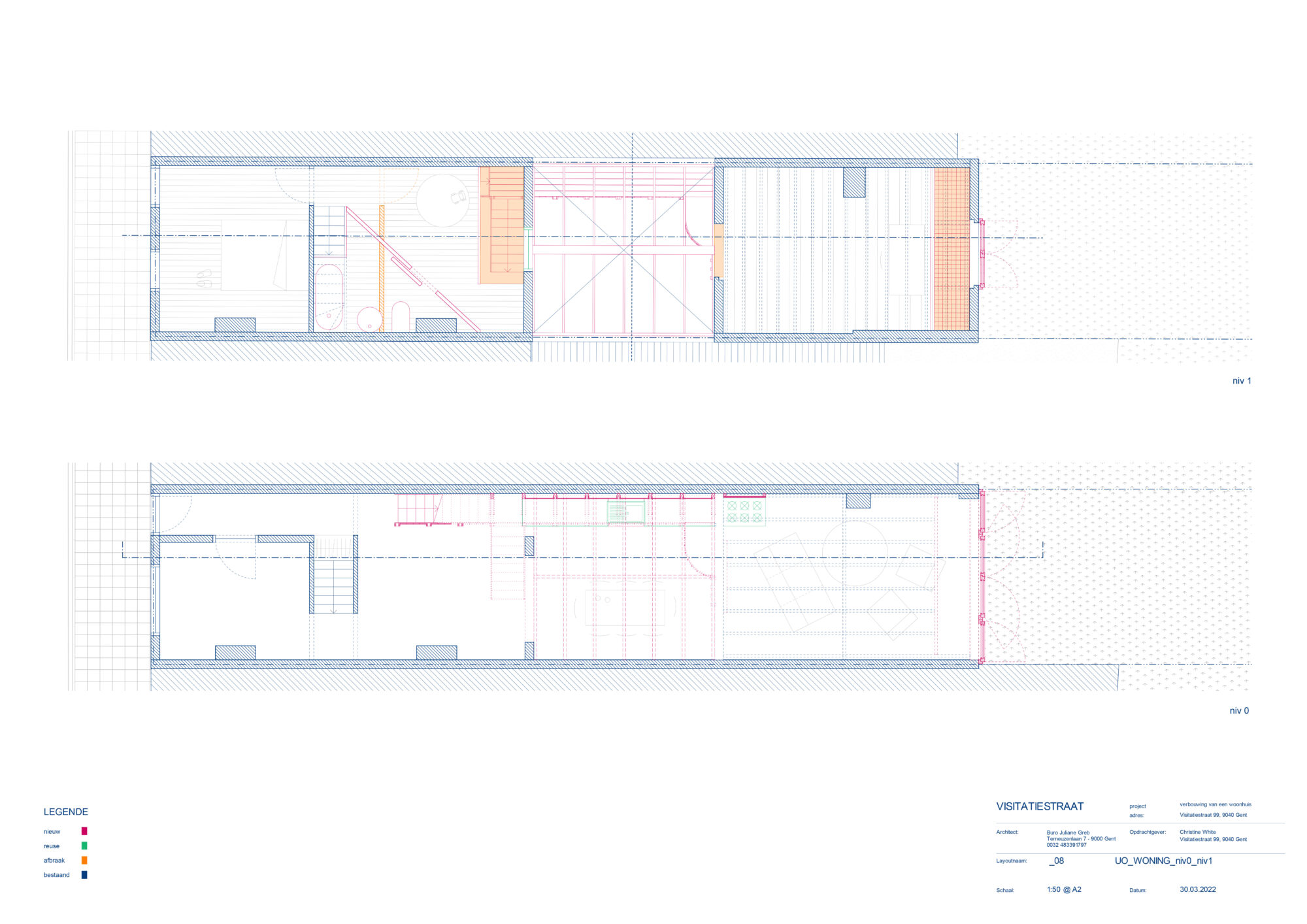
use: coffee shop
location: Ghent
country: Belgium








use: gallery
location: Molde
country: Norway





